AnotherEpic
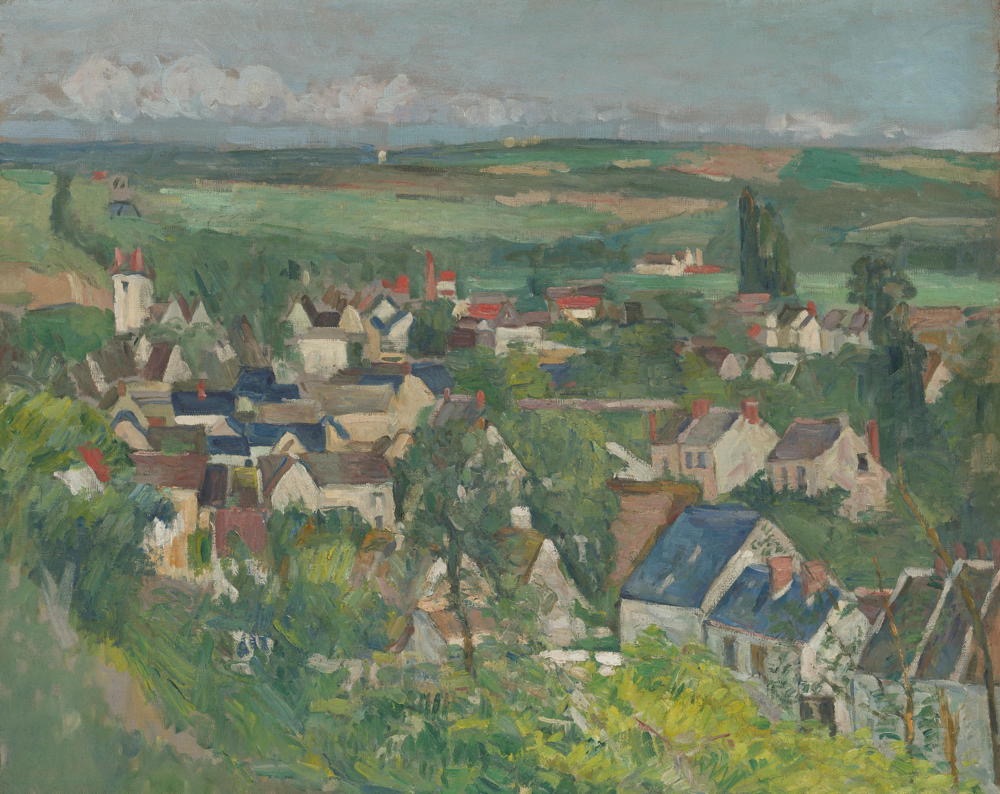
Paul Cezanne: Auvers, Panoramic View (1873-75)
" … surrounded by easily investigated difference …"
The Muse insists a principal's involved. Those who live in a bowl must occasionally rear their heads above the rim to see what's beyond their usual horizon. Bowl-living demands that shift in perspective, and it needn't take much, just a patch of slightly higher ground, anyplace from which one might take a different look around.
We'd both been exhibiting extreme symptoms of late-stage vacation deprivation, our lives demanding our undivided attention again. One can only defer the necessary for so long before their defenses start to take over. Nobody notices the encroaching lack of focus at first, and few ever suspect that they'll be next to completely lose their context. We need a rest sometimes, a time away from the trivial and the essential, a spacer between our endless engagements. We prefer the Toodle, a humble form of reasonably aimless driving. Toodling's best if undertaken without much of an objective, just getting away. I'd plotted an attractive course from which The Muse, as the designated navigator, almost immediately began improvising. In this way, we would stumble upon AnotherEpic adventure where we mostly traveled by secret passages I hadn't even noticed when I first set out our course.
pRead
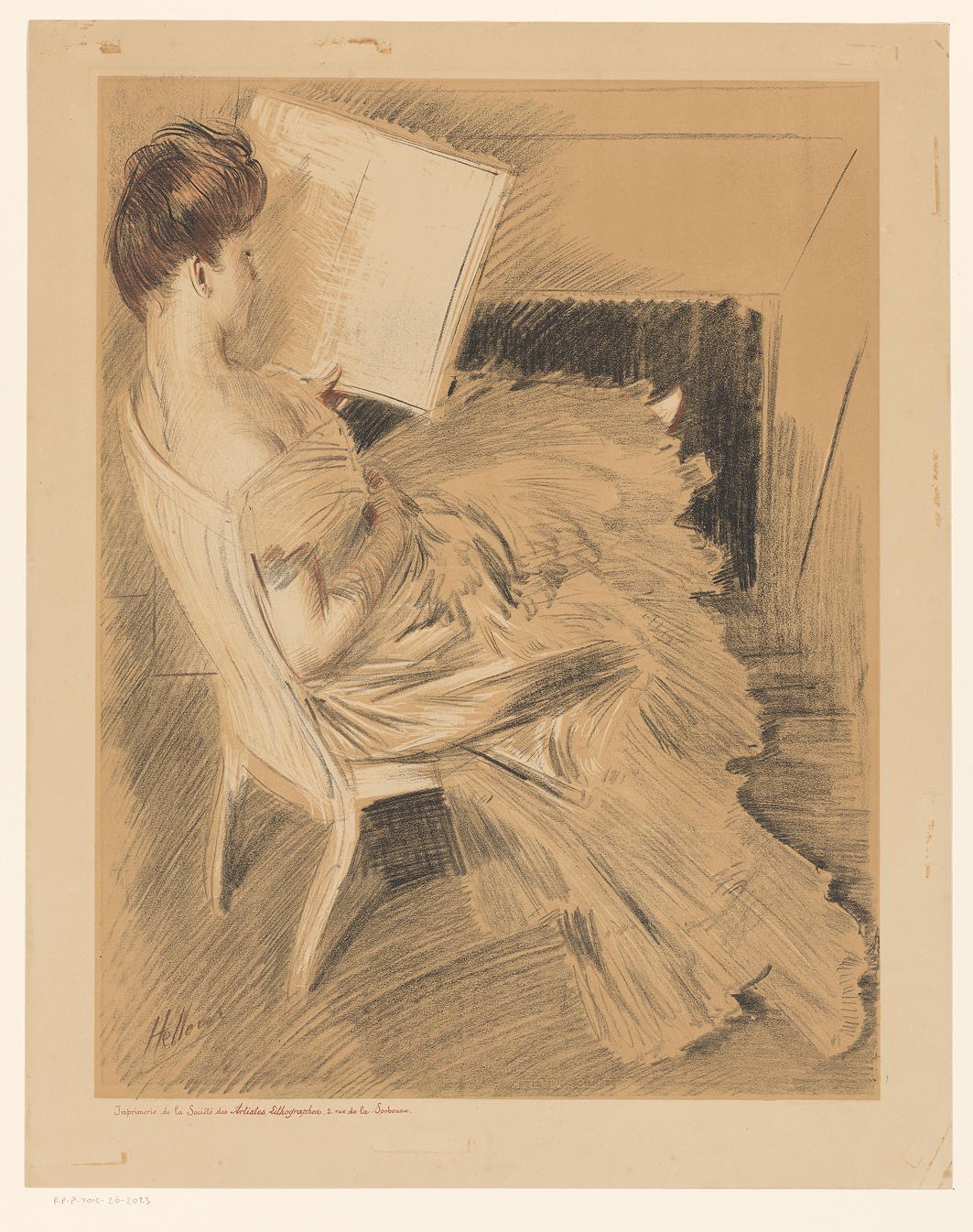
Paul César Helleu: Lezende vrouw in een stoel
[Woman reading in a chair] (late 19th Century)
" … destined to replicate that one imperative."
I noticed a difference when I first encountered information presented on a screen, a mid-seventies CRT, primitive technology by today's standards. Big and bulky, it required a heads-up stance to read what I had formerly mostly absorbed in a heads-down fashion. I found that I could not retain what entered horizontally. The information seemed to slip right through me. It seemed perfectly suitable for transmitting anything that shouldn't require remembering. Indeed, those CRTs were mainly employed to present reference information, data formatted into templates where the same information was placed in the same position from case to case to case. The application seemed ideally suited to disseminating such eminently disposable information. If it needed deeper scrutiny, a screen print function allowed for a more traditional presentation.
Later, training materials began migrating to the electronic platform, baffling me.
AlreadyGone
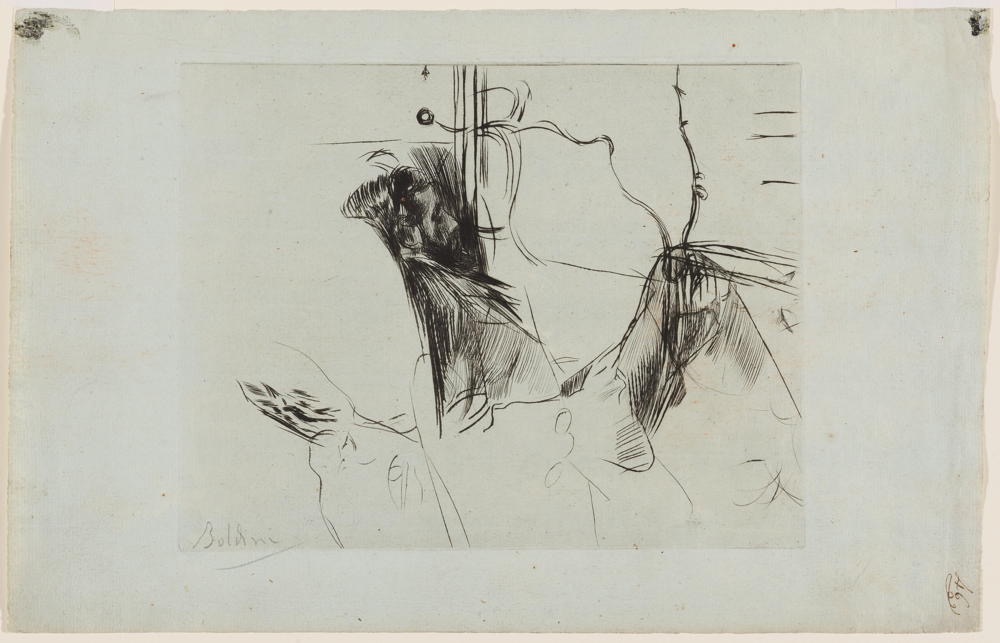
Giovanni Boldini:
Paul-César Helleu, Asleep (c. 1897)
"Time will come when time returns."
My priorities changed as I aged. Twenty years ago, I was all about presence. I actively practiced what I would have unashamedly referred to as "presencing," hoping to seize each moment or something. Twenty years later, I more often seek absence, an active disappearance into whatever I catch myself doing. If something's worth engaging in, it's well worth losing myself in, so I enter with the expressed desire to be transported elsewhere, where might not matter nearly as much as does that transcendent sense of having been utterly transported, slipping through the cracks, flying off the tracks, swiping an AWOL pass.
Flow, for instance, never seemed to be an example of presence but of absence.
Vacationing
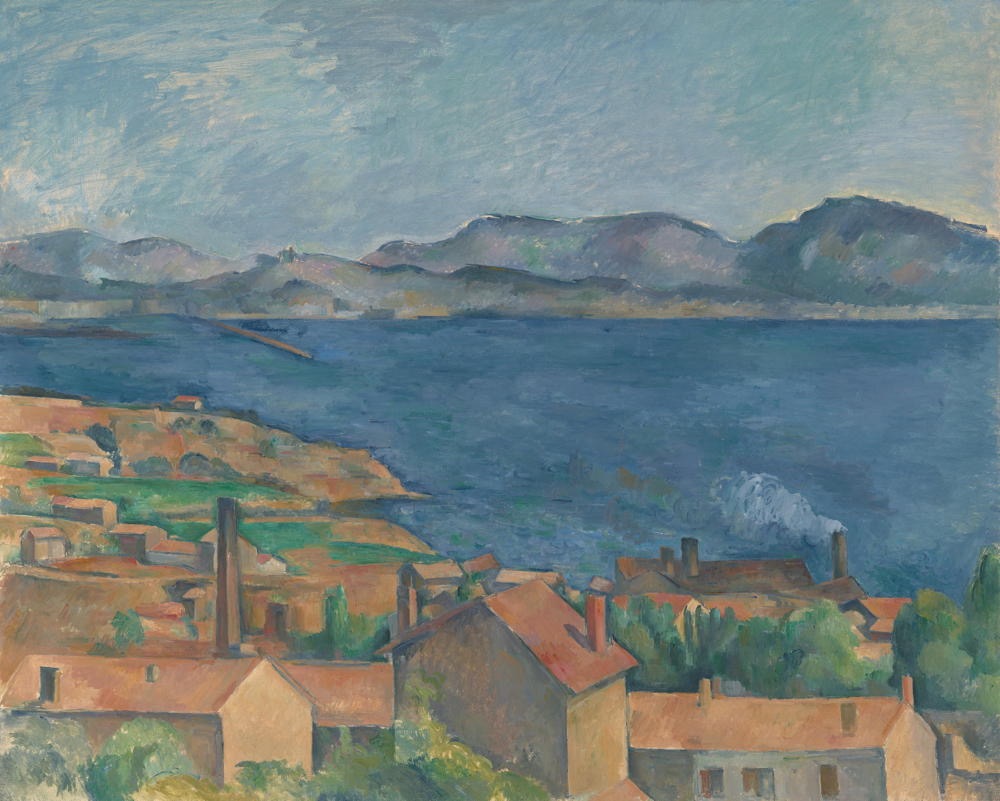
Paul Cezanne:
The Bay of Marseille, Seen from L’Estaque (c. 1885)
" … impatiently waiting for my body to catch on …"
I'm never ready for Vacationing. I dread it like I dread taxes. It seems extractive, determined to undermine my sacred routines. I've never been one to take the same two weeks every August to visit the same home away from home, no familiar lake cabin or annual beach rental. For me, Vacationing usually comes as a last-minute notion. The Muse will insist that we get away when she notices a wrinkle in her schedule. Of course, we've not made reservations, and we plot our path employing accidents, invariably happy ones. We see more than we imagined seeing had we planned the excursion. We vacate for a few days and return glad to be returning, a few fresh stories captured along with some new perspectives.
When I think of Vacationing, I wonder how the watering schedule might be maintained in our absence and who will attend to the cats, not just feed them, but be their companion, for they're family and need more than just access to their feed.
WritingSummary 07/27/2023
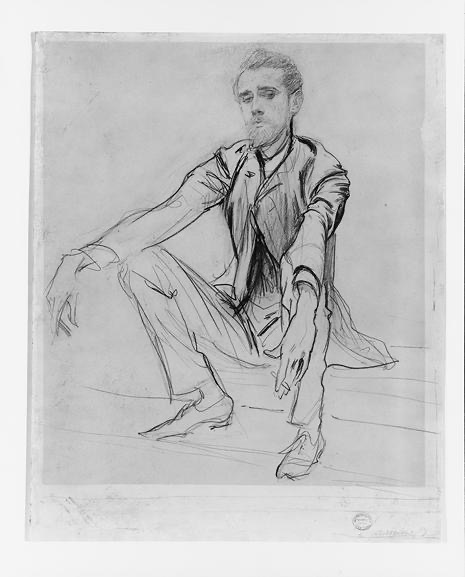
John Singer Sargent: Drawing of Paul César Helleu
from the early 1880s.
Sargent cherished this candid drawing
of his lifelong friend
and hung it in the dining room
of his Paris apartment.
To Confuse and Occasionally Astound Myself
I have this persistent sense that I really should understand whatever I'm doing by now, and some days I almost feel convinced that I might. Later, I stumble upon the depth—or the shallowness?—of my delusion to conclude that I do not know what I'm doing and never have. Should this not prove disqualifying? If I really don't know what I'm doing, what benefit does knowing bring? I realize or hope that purpose might remain emergent, never evident until long after the act. Its absence should not necessarily inhibit my continuing engagement, but writing remains a deeply faith-based initiative, not as advertised or anticipated. I might engage in serial bait-and-switch, but not to hoodwink anybody but myself. The stories tend to untangle themselves in longer runs, on a Contingency basis, often just when needed though rarely under foreseen conditions. I might write to confuse and occasionally astound myself.
Invisible
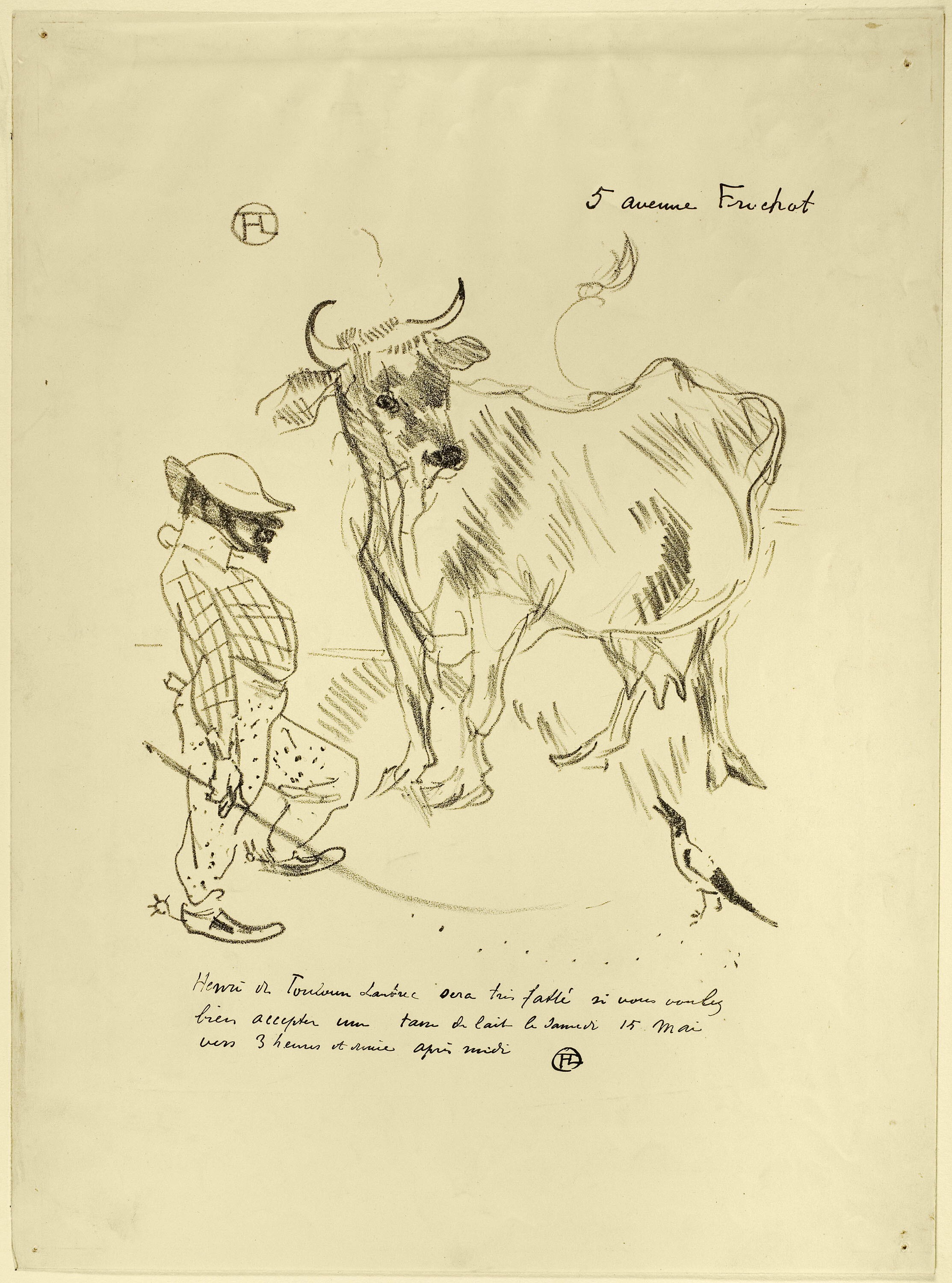
Henri de Toulouse-Lautrec:
Invitation to a Glass of Milk (1897)
"We see everything as we are rather than how it is."
Fortunately for us, this world remains altogether too big and far too complex for any of us to grasp. We too easily see pieces as if they weren't disconnected, and we quickly jump to otherwise unwarranted conclusions. We often misplace the knowledge that we fundamentally understand nothing. The budding satisfaction we feel when things finally seem to be coming clear amounts to the largest illusion by far, for that feeling might be desperately trying to tell us almost the exact opposite of what we suppose it says. We think it means we know when it should reinforce our deepening sense of ignorance. An abiding innocence accompanies all this fuss. We're never nearly as sophisticated as we suppose, and this, too, serves as a sort of buffer. It's very likely that nothing's our fault. Not Global Warming or the rising popularity of the right-wing media, for both were born from our insistent ignorance and the utter invisibility of everything surrounding us and from our unwarranted conclusions, the drawing of which perhaps constitutes our only truly human ability.
I do not intend to make excuses here.
Reconnecting
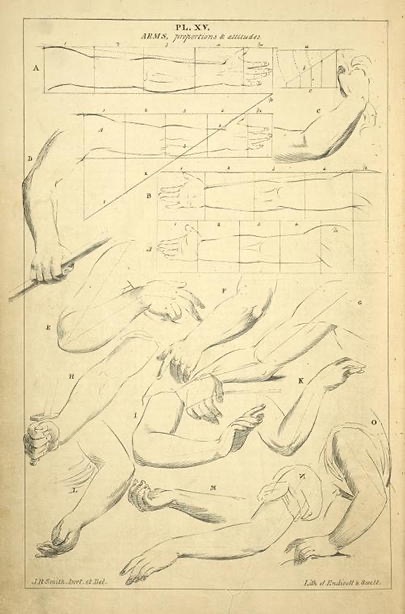
John Rubens Smith:
Arms - proportions and attitudes. (1831)
"Plot twists never redefine our heroes."
What experience serves as information and what as definition seems as a much better question, Mr. Shakespeare. To be or not to be comes in, at best, a distant second, for many different states of being exist simultaneously, and not being seems to take the whole question of that side of the equation out of the running. Being or nothingness or Being And Nothingness? These hardly amount to questions, either. The Information/Definition Divide continually haunts each of us and profoundly influences our choices. My fleeing bout of Deltoid Bursitis adopted both guises throughout its tenure. It arrived as simple information, spawning questions first focused on identifying causes. I then held no doubt that the disability would pass quickly. My denial of it characterized our initial relationship. I analyzed it as if it afflicted somebody else. I mostly felt confused by its informational content.
I later came to mistake it as definitional.
Reagency
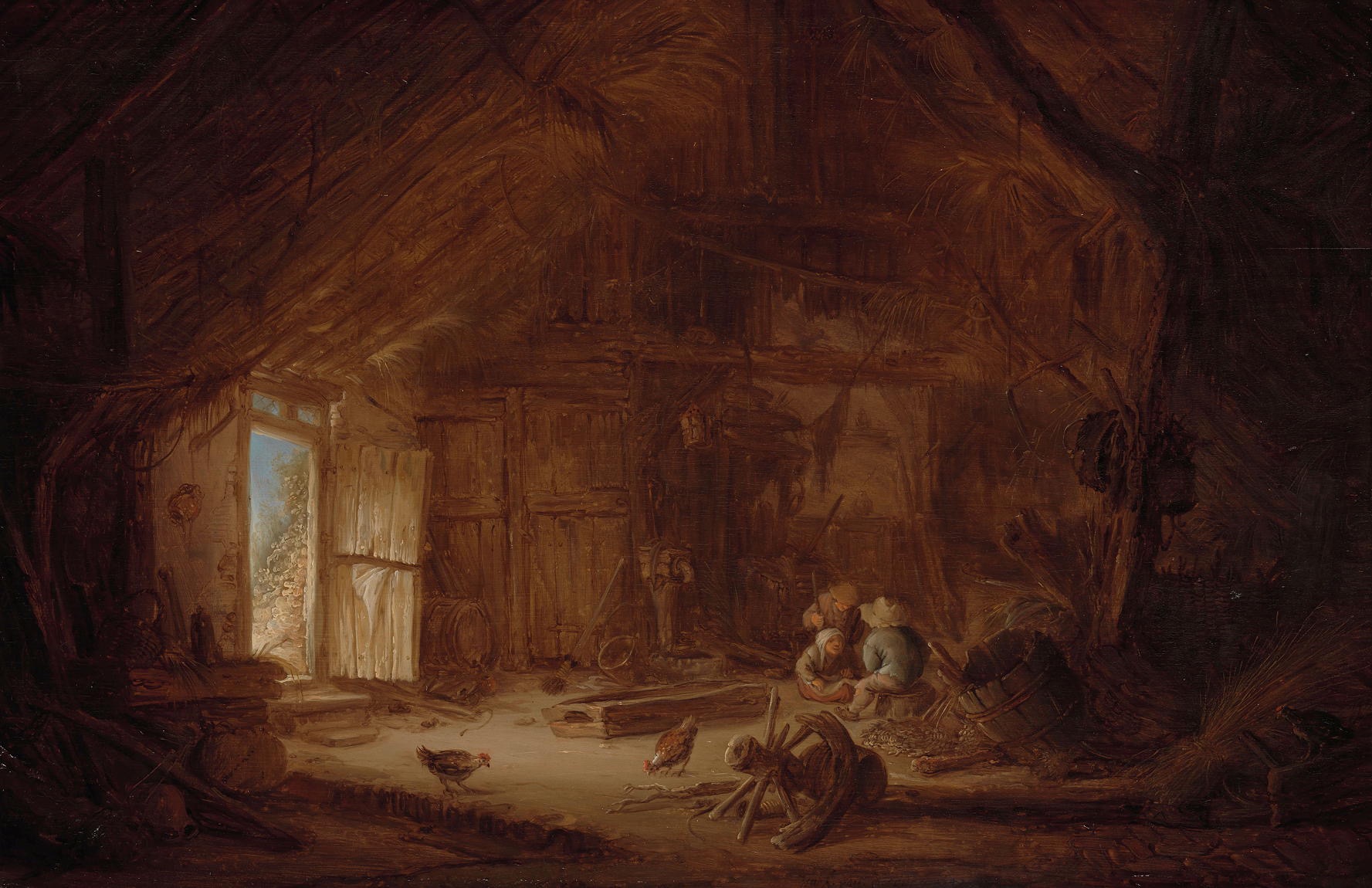
Isaac van Ostade:
Interior of a Stable with three Children (1642)
" … driving home with dirty blues blaring …"
By late July, the garden takes on a frantic aspect. Its regeneration has gone exponential. Cucumbers mature from flowers overnight, and The Muse leaves her morning perusal with both hands full of produce. The tomatoes come next, challenging our tolerance for beneficence and Caprese salads. The apricots produced five years of fruit in a single season, and even the geraniums have gone frantic, needing nearly daily deadheading. We're suddenly running to keep up with what seemed passive last week. It's difficult for me to remember that half the growing season's already gone and that abundance tends to be backloaded, appearing only well after seemingly unacknowledged nurturing occurred. The return comes later when it's almost completely disconnected from its origins, the entire operation utterly dependent upon equal portions of prior knowledge and patience.
I visited the acupuncturist yesterday, an entire month after scheduling the appointment, a whole month and more after the immediate care doctor gave me his diagnosis.
ContingentStory
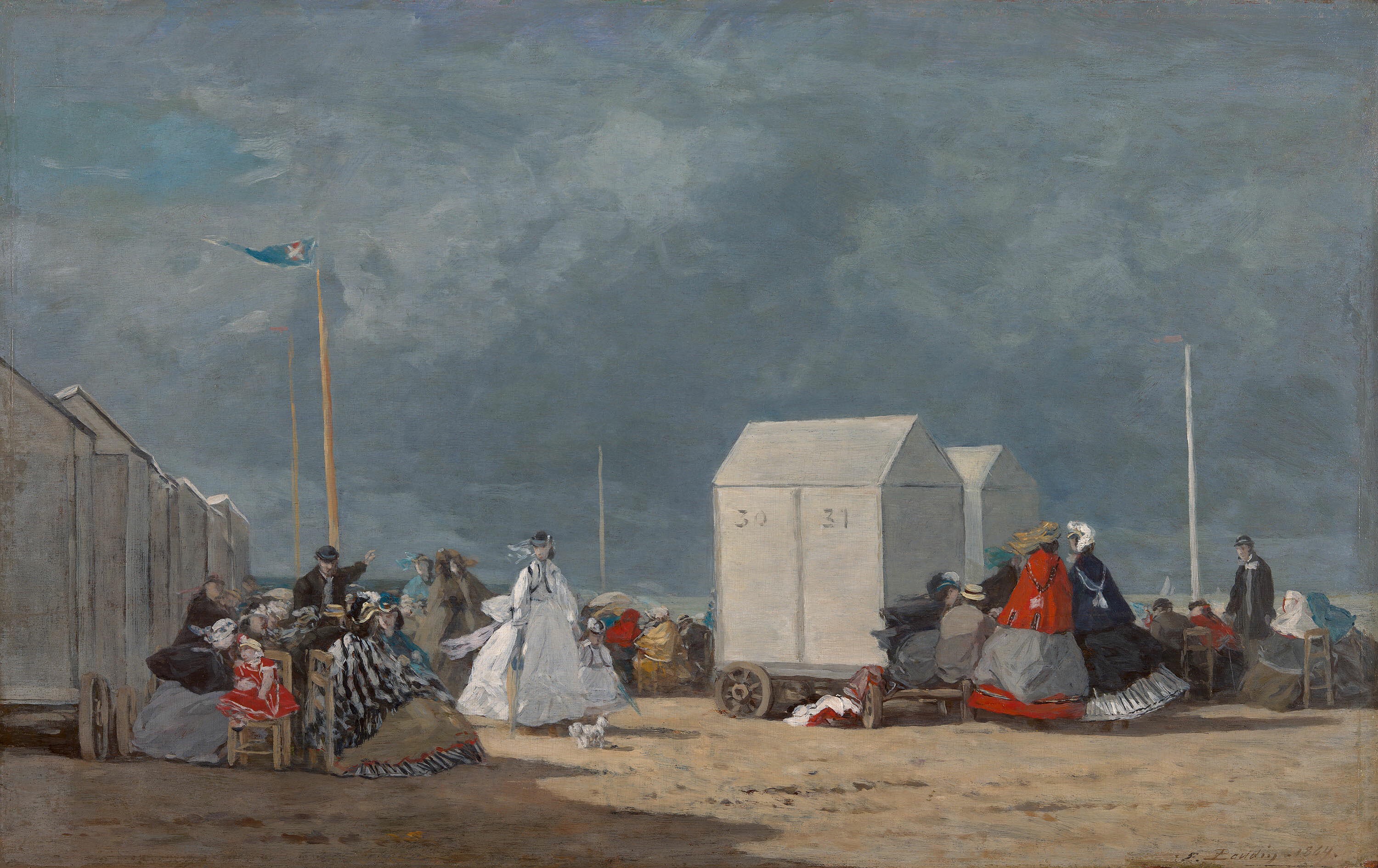
Eugène-Louis Boudin: Approaching Storm (1864)
" … the last taste of unremarkable normalcy …"
I write this story for another time, for the time when it will be necessary. Today is not that time, for all seems relatively healthy and humming this morning. One day, though—not today and probably not tomorrow— such a story will be necessary, and the need will be evident to everybody. It seems as though days follow head to toe in an unchanging succession, but sometimes something disrupts that rhythm, transforming the familiar into alien form. Nobody knows how to respond. We lose our minds then or find it impossible to find them. We have no pattern from which to draw. We only notice something missing. I write this story for that morning, for the time I know for certain is coming without knowing anything about when it might appear. When that eventually occurs, may I happen upon this story buried in my archives and find solace and reassurance. I do not know precisely what I might need then, but I can pretend this story might satisfy what I cannot foresee. Let this one serve as my ContingencyStory.
I direct myself to remember when, to look back to the morning when I created this story, back before the previously unthinkable happened.
Testing

Pierre-Paul Prud'hon:
Cupid Testing His Arrow
(Late 18th, early 19th century)
" … counting my cards, plotting my escape …"
I split these days between resting—forced idleness—and Testing—challenging my barriers. I'm supposed to cool my heels, but my heels already seem plenty chilled, and there's stuff in which I really should be engaging. The apricots won't pick themselves. The yard can't water itself, either, and supper, if it's ever going to come, requires some goading, some human intervention, or else I'll have to accept that I'll go without it again. I have my writing ritual to maintain, too, so I feel compelled to continue doing, albeit on a significantly reduced scale, or not doing will very likely become what truly ails me.
I was born to poke sticks into darkness, continually probing edges.
Rest
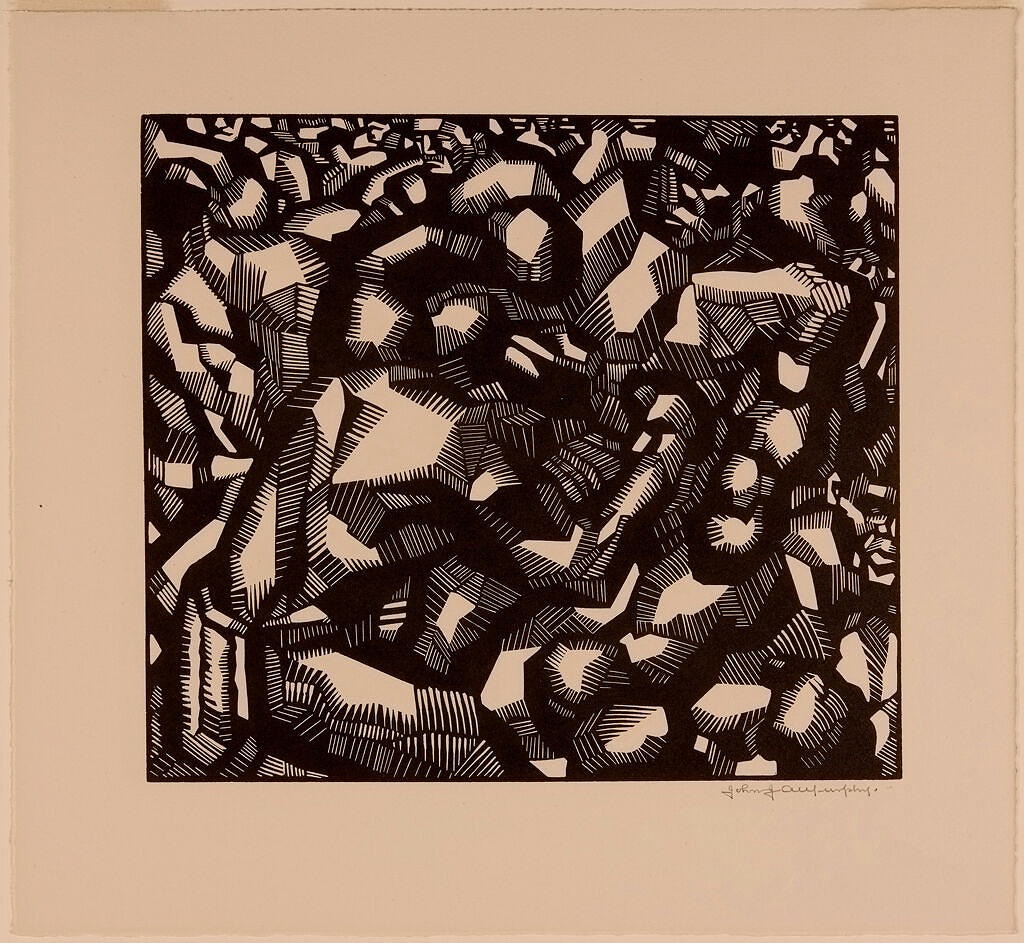
John J. A. Murphy: Athletes at Rest (20th Century)
"A discontented grumbling accompanies …"
Forced rest seems anything but restful. It quickly induces resentful feelings, even in the more practiced procrastinators, for it looks really different from playing hooky—genuine slacking. Being ordered to relax leaches much of the fun out of the effort, rendering it more work than fun. One cannot be meaningfully permitted to possess what must rightfully only be freely taken. Without that freedom, Rest becomes nothing like what the sentencing judge intends. It cannot possibly be healing. It becomes a form of avoidance, a demerit rather than an accomplishment, a ruthless, if not all that unusual, form of punishment. The urge to idle ages poorly, quickly transforming itself into simple boredom, turning its practitioner into nobody worth emulating, worse than worthless in his own eyes.
All the work not engaged in gathers around him.
Recovering
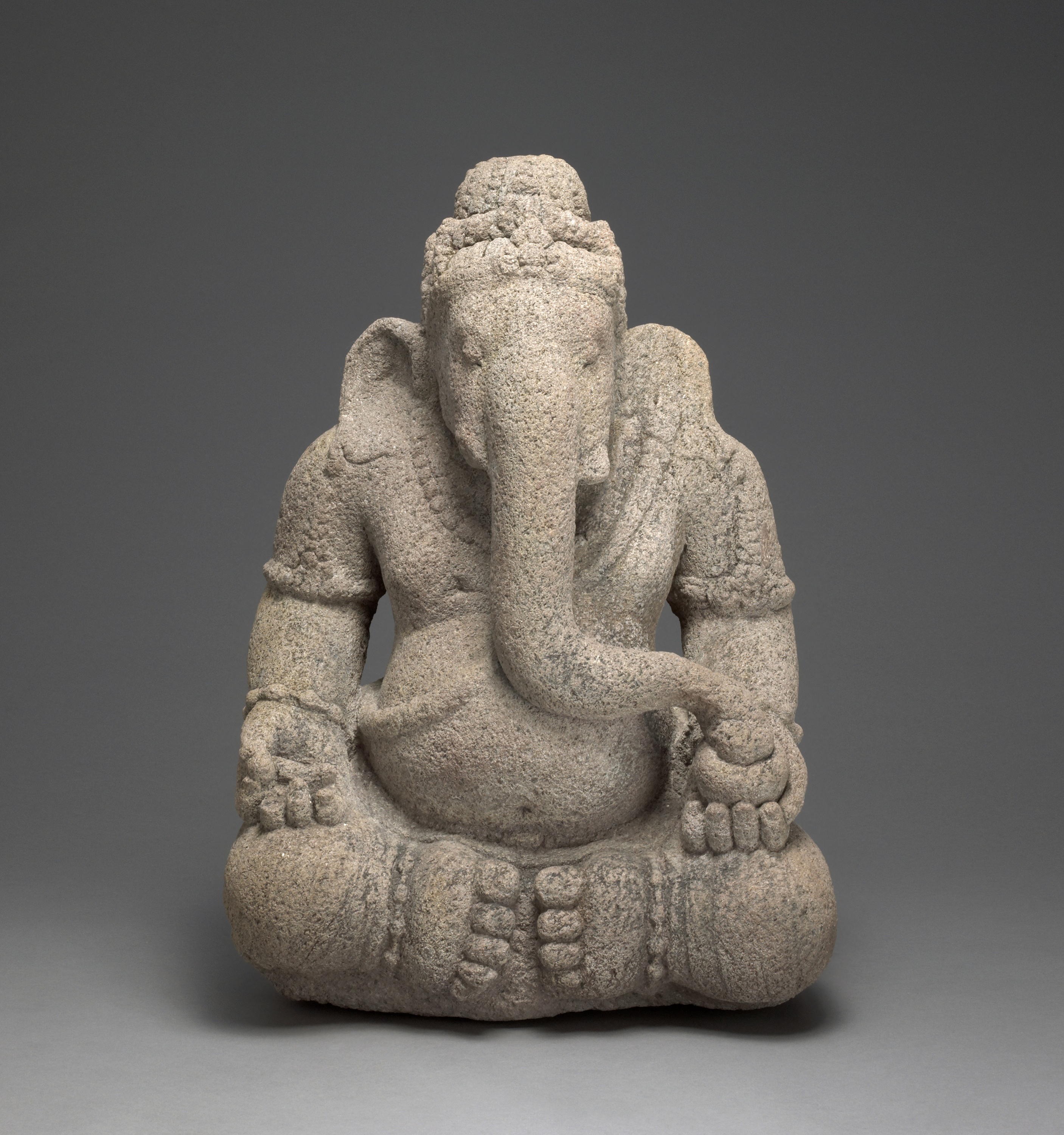
Indonesia, Central Java:
God Ganesha, Remover of Obstacles
(9th/10th century)
"I have no fallback position …"
I despise lingering. I much prefer events to come and go cleanly without smearing messes all over the countertops. My wounded shoulder (Deltoid Bursitis, the doctor diagnosed) continues lingering, leaving me feeling like a malingerer in the middle of harvest season. I've been resting as the doctor prescribed, resting then testing, for I know of no other way to determine if the ailment's past than to do things beyond the prescribed boundaries of resting. I have accumulated enough rest over the past two months to make up for every sleepless night I've ever experienced, and still, the pain returns with little encouragement. Lifting a gallon of milk recently set it off again. I am becoming surprisingly adept at using my left arm for most things.
I realize that I'm enrolled in some graduate studies in the fine and frequent art of Recovering.
WritingSummary 07/20/2023
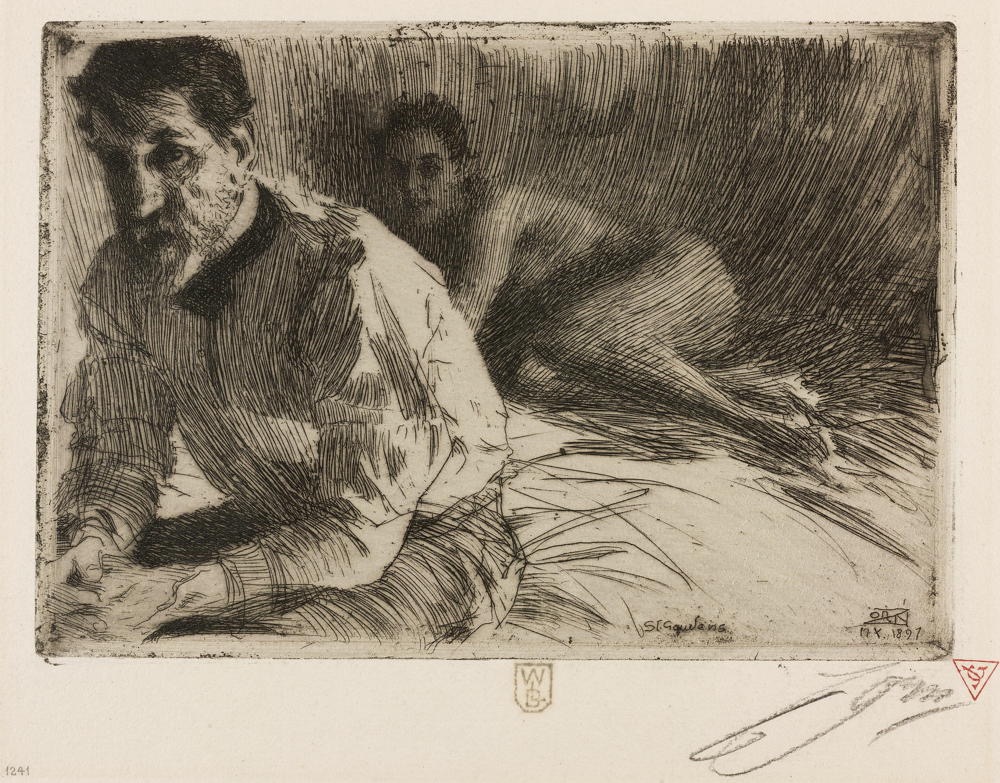
Anders Zorn:
Augustus Saint Gaudens II
[Saint Gaudens and his model] (1897)
A Step In A Very Long Cycle
I find partially decomposed apricot pits in my flowerbeds because in years past, I threw the culls into our compost heap, where the fruits would quickly decompose into rich dirt, but the pits would remain like small stones in the mix. The Rule of Compost insists that whatever ends up in there will be resurrected many times, eventually becoming indistinguishable from surrounding dirt—eventually becoming dirt—except for those pits, which remain for decades as markers of the dirt's heritage. This writing week found me loading up the compost heap with apricot culls again. We've had more bumper crop than we can keep up with, so each day has a period where I collect smashed remains. I set down tarps to catch most of them because it's easier to scoop up the goopier ones off the tarp than off the sidewalk. This chore will be the first step in a very long cycle, one which will continue long after The Muse and I leave this place behind us. This weekly writing summary seems like a similar effort, a step in a very long cycle, too.
Weekly Writing Summary
I began my writing week recounting my experiences U Picking produce after an afternoon picking somebody else's cherries in ForToBe. "I seem to need to be a multiplicity, switching roles and identities. I could never bear to merely remain whatever I'd become. Achievement breeds its own dissatisfactions."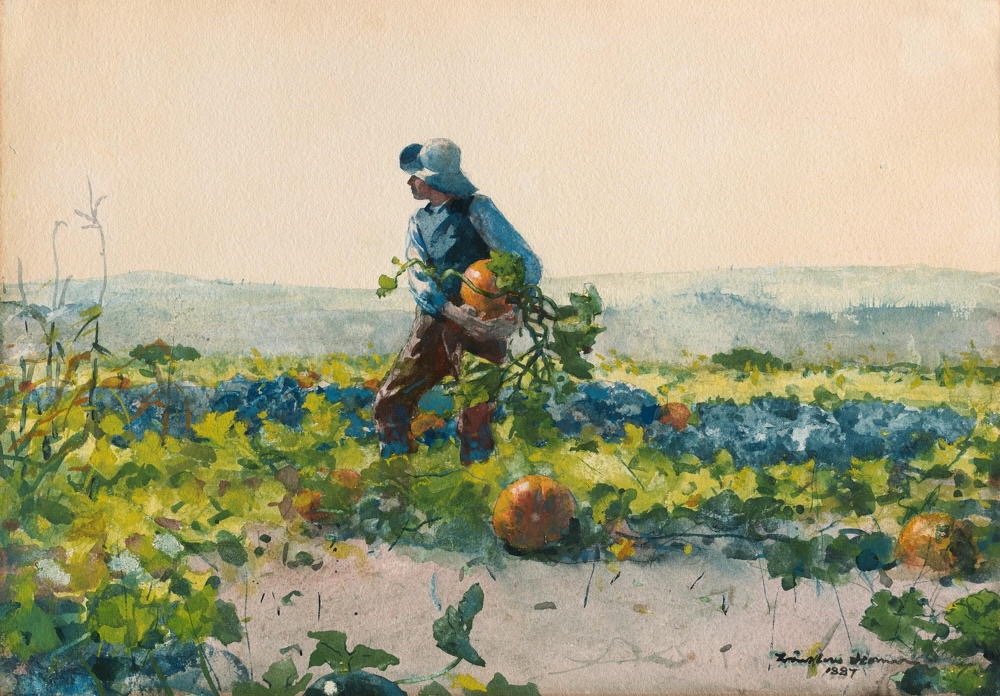
Winslow Homer: For to Be a Farmer’s Boy (1887)
"ForToBe a farmer, or a manager, or just a writer sometimes."
—
I continued writing, remembering when I discovered a cache of my mother's home-canned Italian Prunes when cleaning out the old home place in Preserving. "We preserve for an uncertain future. Perhaps we only preserve for ourselves. Or maybe, just maybe, we preserve to preserve the tradition."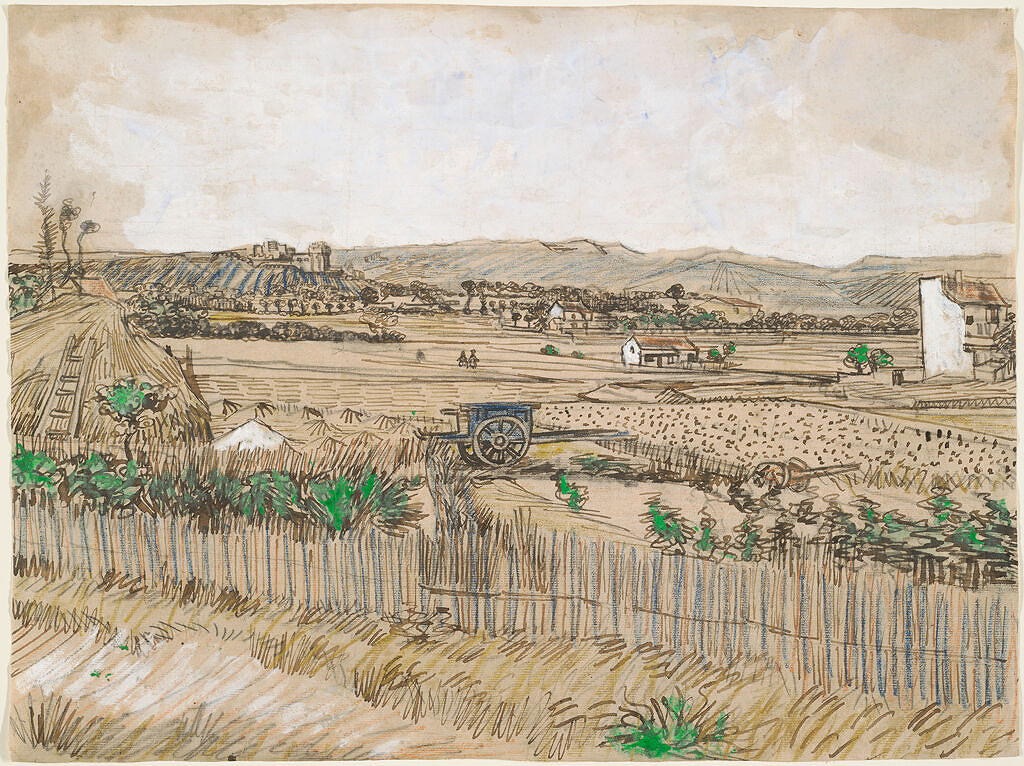
Vincent van Gogh: The Blue Cart
[Harvest at La Crau] (1888)
" … wipe away my leaking past."
—
I explained how I source the images I use in my postings in Museo. "It's a brilliant contribution, and in the spirit that I post and in which the Internet was created, it's not seeking profit, just a better world."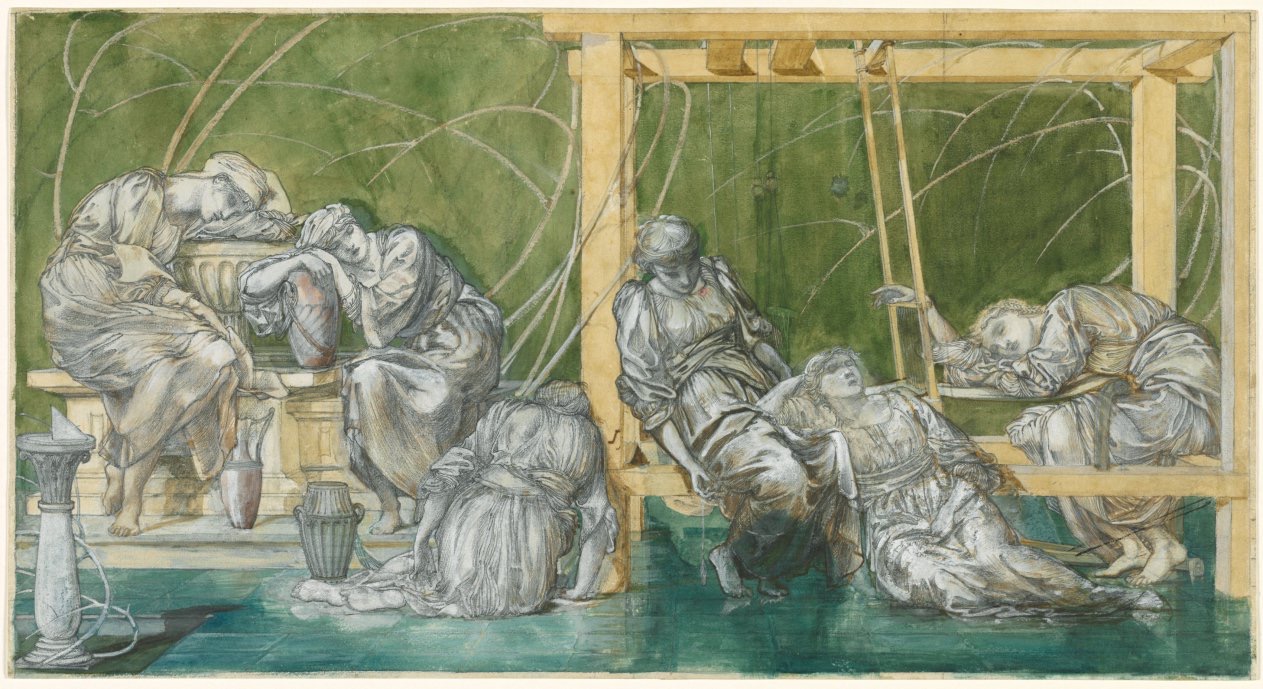
Edward Burne-Jones: The Garden Court (1870–75)
" This work continues in earnestness and love."
—
I told the story of what I labeled the StandardDilemmas, those situations which render us powerless. "We're raised on fables and typically so damned full of ourselves that we cannot quite believe in our occasional powerlessness. We rarely acquiesce, thinking it a form of cowardice, so we make a fuss and produce much of the drama surrounding us."
Lucas van Leyden:
The Expulsion from Paradise (1510)
" … continue collecting experiences."
—
I described how a friend had agreed to pay a cool half million dollars to buy a hovel in a neighborhood of other half-million dollar hovels in *Homemading. This story proved the most popular this period! "Societies thrive on humble beginnings that promise, fifty years hence, a fenced yard where the grandkids can romp with the neighbor kids."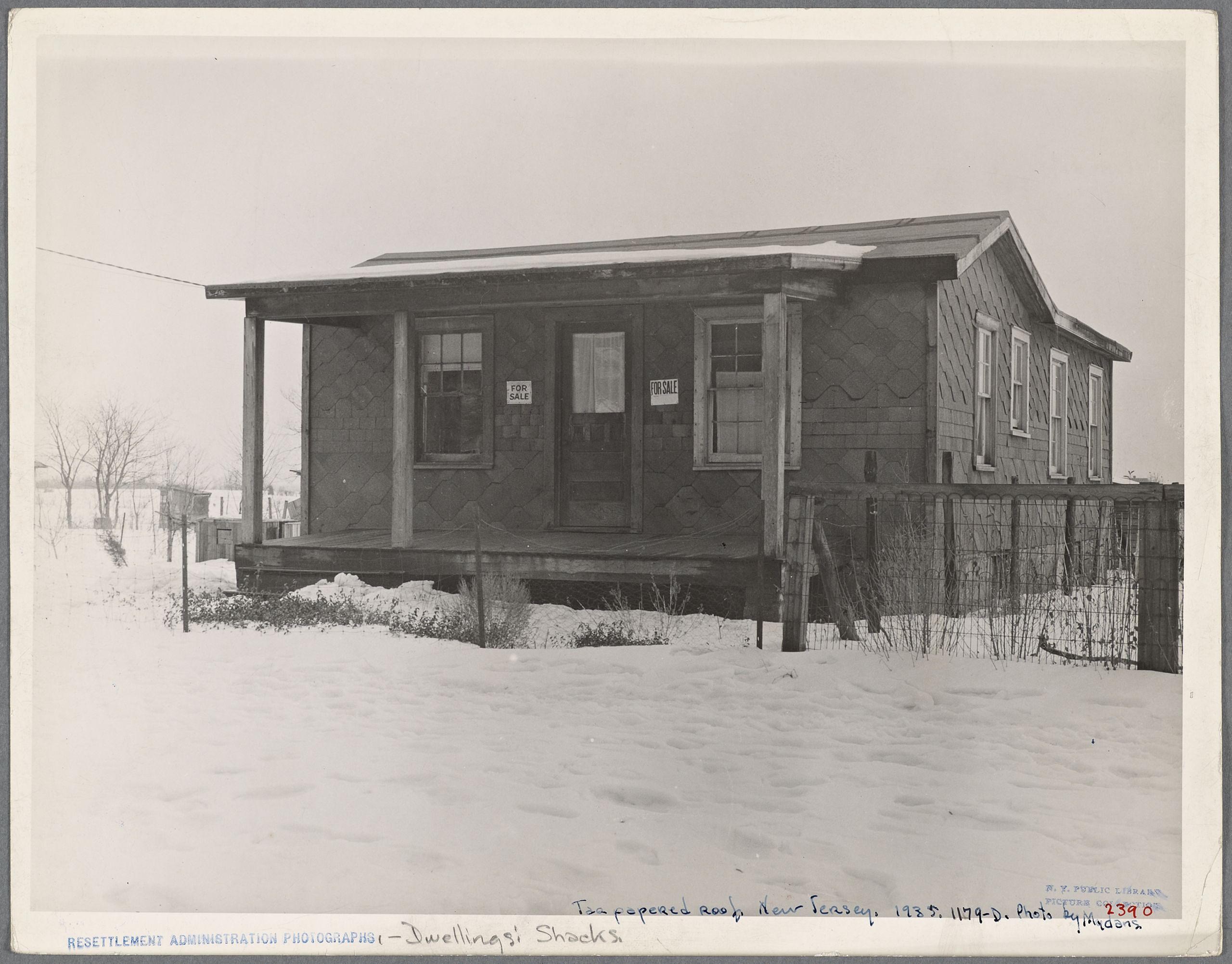
Carl Mydans:
Tar papered house in New Jersey. (1936)
"Societies go to wither and die where everybody tries to earn a cool million in real estate."
—
I next spoke of dreams not coming true and of how I managed to get through my first great disappointment by playing A Different-Shaped Guitar. "I lost nothing of substance when I hit that wall. I only lost a medium that, truth told, had not been working for me for a very long time. Dreams, even the best of them, can only ever sustain a dreamer so far."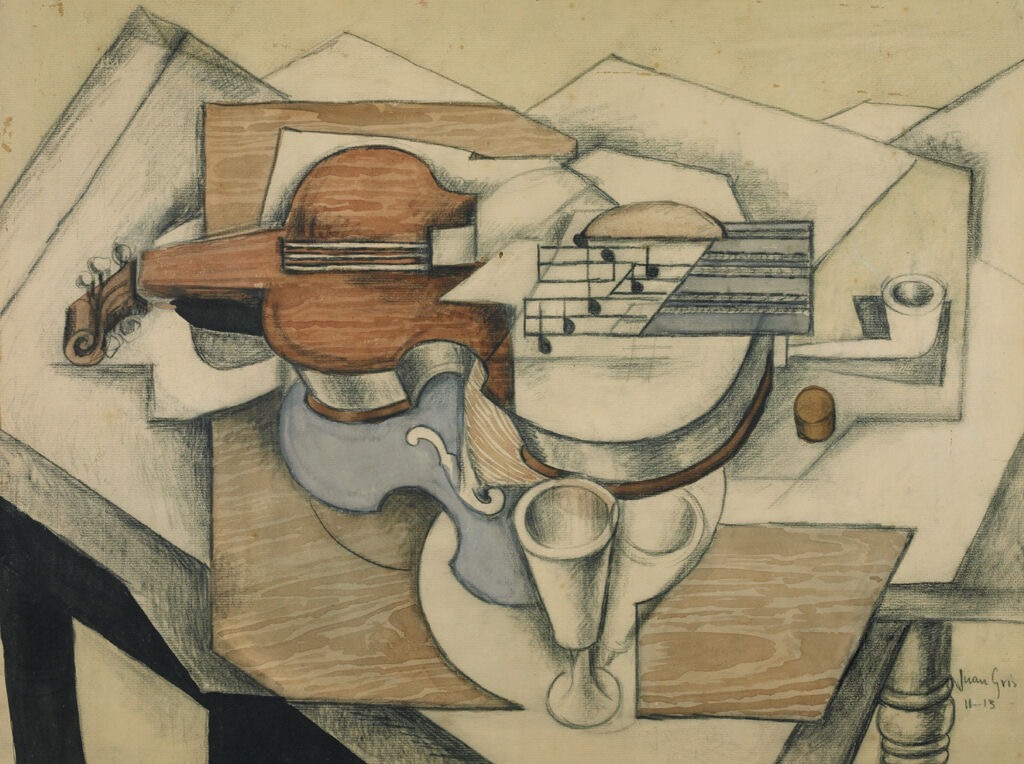
Imitator of Juan Gris: Still Life with Guitar (1913)
" … a success or a failure might depend upon nothing other than whether …"
—
I ended my writing week on a serious but lighter note, describing what I personally consider to be SartorialSanity. "The Muse is forever asking me how I like her "top" I hadn't noticed. I almost always insist that whatever she's wearing looks just fine. I wonder what she thinks she's doing, asking the opinion of someone who considers his stained Chambray painting shirt the height of SartorialSanity."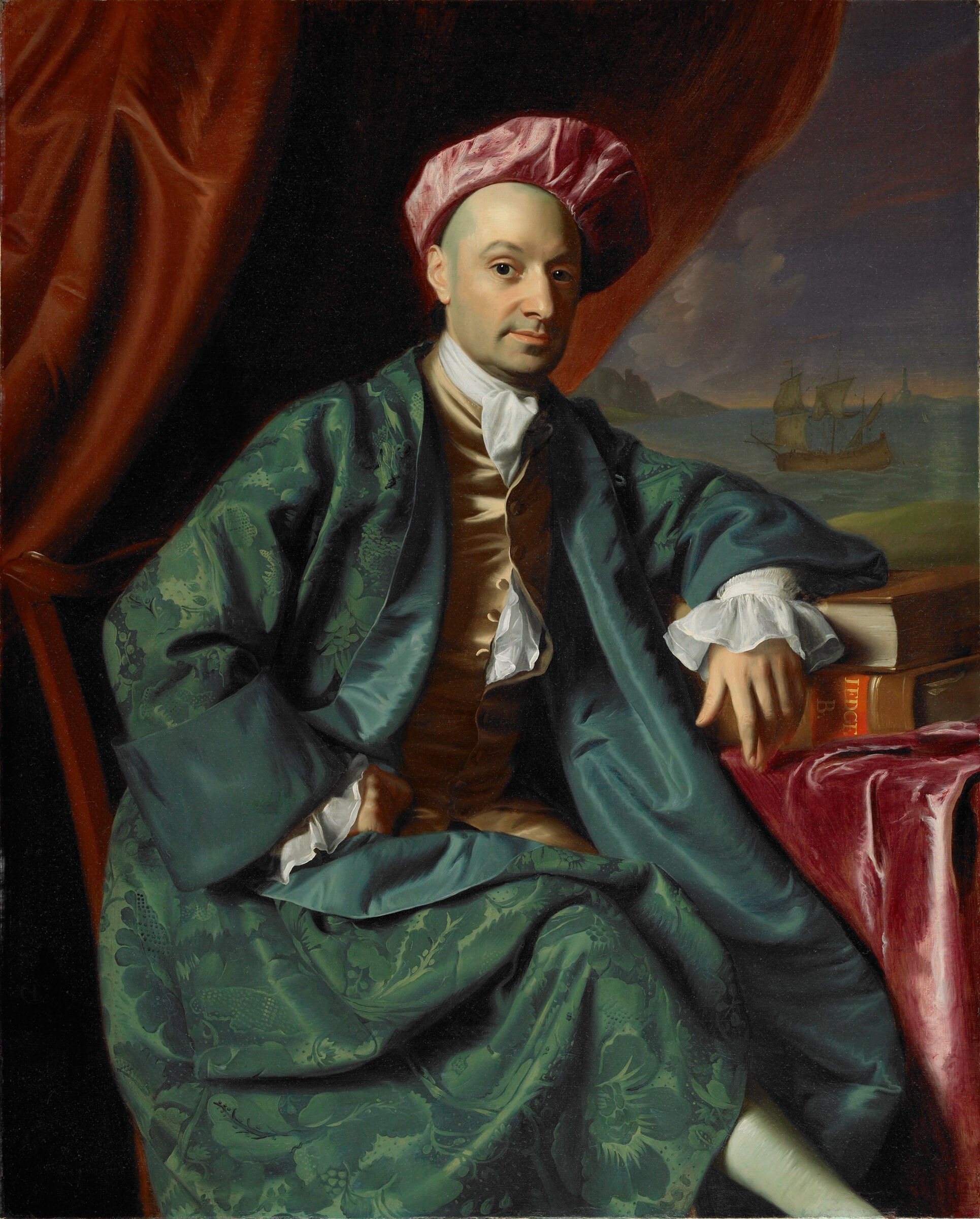
John Singleton Copley: Nicholas Boylston (1767)
"It's all about how they feel."
—
We're in that season where every morning promises to turn into Too Darned Hot before noon. Early morning offers the only respite. The cats and I inhabit those hours like refugees, reveling in sweet breezes before they become dehydrating again. MidSummer's a dreaming season, like its first cousin MidWinter, where sanity depends on an active imagination. I began this writing week with ForToBe, imagining someone I only occasionally get to be and never completely. The Muse and I accomplished some Preserving, thinking we were mainly trying to preserve ourselves and our traditions. I stumbled into a nest of Standard Dilemmas. Who doesn't sometimes? I was reminded of the downside of ever-expanding real estate markets and fondly recalled learning to play A Different-Shaped Guitar. I ended the week appreciating the insanity that manages, most days, to keep me sane and beautifully dressed, at least according to my standards. Thank you for following along here.
©2023 by David A. Schmaltz - all rights reserved
SartorialSanity

John Singleton Copley: Nicholas Boylston (1767)
"It's all about how they feel."
I have been Honing my fashion sense since my early teens, and I formally swore off short-sleeved shirts. During my professional career, I insisted on wearing starched shirts and woolen trousers regardless of the season, later gravitating toward blue jeans and simple cotton shirts. In recent years, I've reduced my wardrobe to the basics: long-sleeved blue chambray shirts, blue jeans, and Barefoot® shoes. My nod to seasons includes optional socks in the summer and cotton jersey pullovers through the cooler months. My closet holds a dozen almost identical cotton shirts and a spare pair of jeans. That's as dressy as I ever care to be these days.
I do not wear shorts, whatever the weather.
A Different-Shaped Guitar

Imitator of Juan Gris: Still Life with Guitar (1913)
" … a success or a failure might depend upon nothing other than whether …"
At some point in their career, everyone hits their wall. The fortunate find more than one. The experience fully qualifies as the most discouraging anyone ever encounters because it represents the end of a long and satisfying dreaming period. The Wall, at first innocuous, eventually becomes a serious barrier, impossible to go over, under, around, or through. What's a protagonist to do in the face of this flummox? The standard answer responds "Something else." Anything else.
The 'anything else' comes as a forced choice, a coerced alternative that nobody would ever wish upon themselves.
Homemading

Carl Mydans:
Tar papered house in New Jersey. (1936)
"Societies go to wither and die where everybody tries to earn a cool million in real estate."
The Villa Vatta Schmaltz was no villa when The Muse and I bought the place nearly a quarter century ago. It then promised to serve as our fixer-upper, our bottomless money pit, our eventual salvation. We paid too much for it, which would not get us into a dilapidated garage in the current market. Like many neighbors, we could not afford our place if we tried to buy it at today's prices. Today's real estate prices have always seemed insane. Yesterday's have always seemed crazy, too, but for the opposite reason.
I bought my first house for $49,950.
StandardDilemmas

Lucas van Leyden:
The Expulsion from Paradise (1510)
" … continue collecting experiences."
I believe in the existence of a set of StandardDilemmas whose primary nature has always been that they utterly negate human agency. No matter what even the most well-meaning human might muster in the face of any of these, that human will remain utterly powerless against it. One might exhibit wisdom when encountering one of them to cede to the superior force, to go without much kicking or screaming, for they represent incarnate fate. If there's nothing to be done, then nothing might serve as the proper response. Yet people rarely exhibit such rationality when facing inevitables. We're raised on fables and typically so damned full of ourselves that we cannot quite believe in our occasional powerlessness. We rarely acquiesce, thinking it a form of cowardice, so we make a fuss and produce much of the drama surrounding us. If the arrested person would just go without a fuss as the arresting officer thoughtfully asked, the unfortunate experience might pass without raising a ripple in the pond. We often insist upon making needless tidal waves instead.
It's not that we don't usually know when we've encountered one of The StandardDilemmas.
Museo

Edward Burne-Jones: The Garden Court (1870–75)
" This work continues in earnestness and love."
Their structure has changed in the six years and counting since I began writing these story series. Early postings featured inconsistent format from story to story, though all have remained about the same size, approximately seven hundred words, give or take. Each has featured an image, one which I used to help me focus, for I always, always, always seek an image first before I start writing a story. The image allows me to envision what I'm doing and serves as my companion as I create. I often find myself taken by an image, its creator's story, or both. You might have noticed that sometimes I've employed a series of pieces by the same artist over a week or ten days because I was just so taken by that artist's work, Matsubara Naoko a great example.
Finding that art has become easier over time.
Preserving

Vincent van Gogh: The Blue Cart
[Harvest at La Crau] (1888)
" … wipe away my leaking past."
After my father died and my mom relocated from the family home into assisted living, I helped clean out that old home place. It was over-filled with memories of times by then long past, as embodied in my mom's knick-knack collection, the mere existence of which spoke of bygone ages. Do people still collect knick-knacks? Most stuff elicited no emotional response from me, but somebody in the family found almost every "treasure" evocative. For me, the basement Fruit Room held by far the fondest memories and evoked an epic lumpy throat. Those shelves behind those plain plywood doors held at least thirty years of Preserving experience in fine quart jars still lined up like well-disciplined soldiers standing at attention.
There were Italian Prunes from the late sixties, I swear. I think I was there when she "canned" them in the steamy mid-summer kitchen.
ForToBe

Winslow Homer: For to Be a Farmer’s Boy (1887)
"ForToBe a farmer, or a manager, or just a writer sometimes."
Fruit picking has been a part of my life since I was a toddler. I felt liberated yesterday when standing near the top of that tall orchard ladder with my head nearer the stars and my hands pulling five, six, seven, or eight cherries off at a time! Whatever the crop, my experience seems similar. I face a randomly-distributed collection that I try to tame. I feel challenged to figure out a process that promises progress as well as satisfaction. I often need to recover almost-forgotten techniques, though no harvesting yields to any single best way. The Muse scrambles up very near the top of any ladder she climbs, preferring altitude above all else, while I typically make my stand mid-way. We pick at almost the same rate.
Some crops demand that I get down on my knees as if to pray and reverently harvest.
WritingSummary 07/13/2023
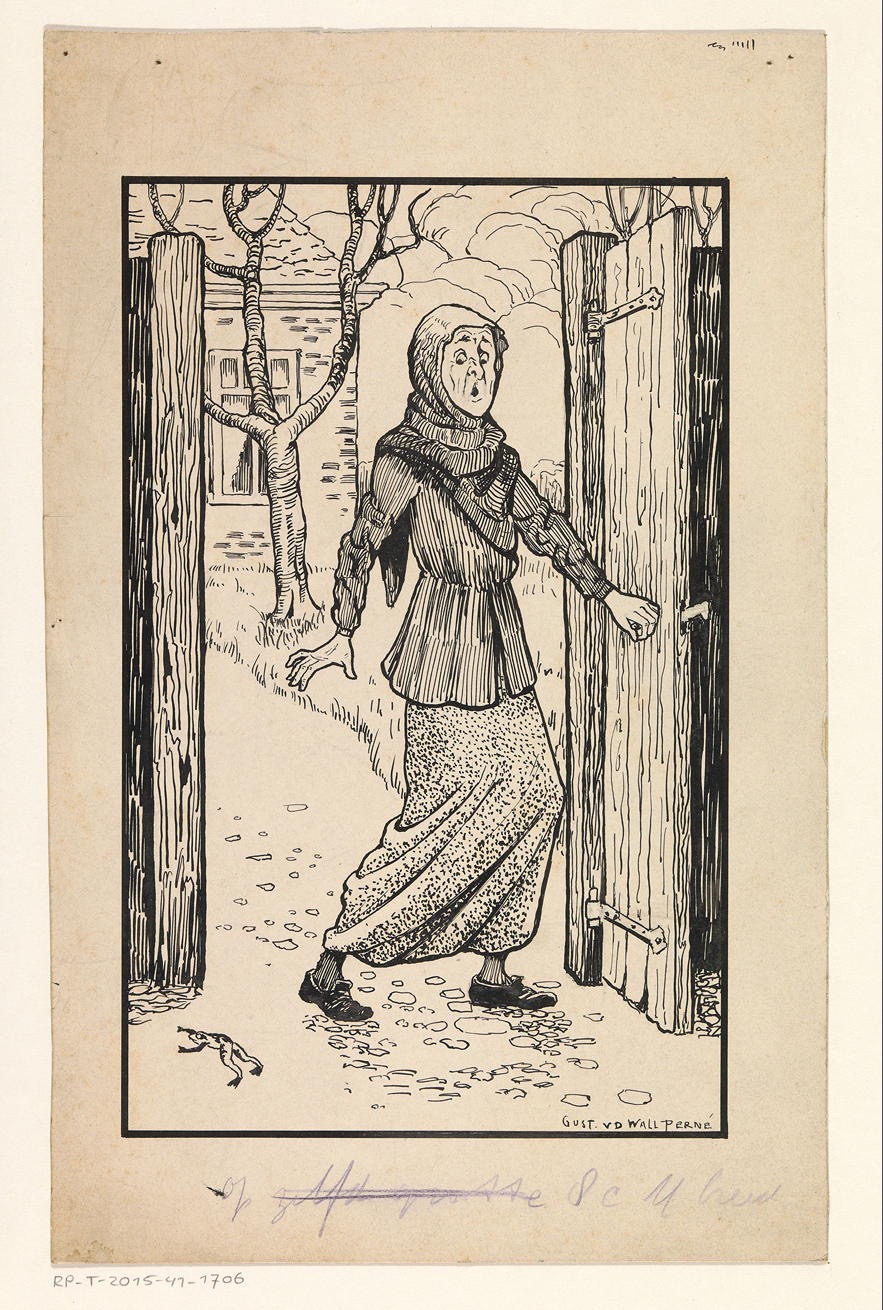
Gust van de Wall Perné:
Vrouw schrikt van een kikker
[Woman scared by a frog] (1887 - 1911)
More Abundant Than Strictly Necessary
This writing week was a genuine embarrassment of riches. The apricot tree's fruit finally ripened, always a momentous happening. It produces more fruit than any ten families could reasonably consume. I realized I still needed to purchase a tall ladder to reach the highest branches. This fruit ripens first and plummets to the ground or onto anyone passing beneath. The fruit seems almost liquid, splatting in joyous reunion with gravity and the Earth. I spend some time each morning shagging fallen cots, collecting their smeared carcasses before interring them in the compost heap. The world seems too alive by at least half, and The Muse and I rush to try to keep up, a fool's mission, a cherished task. This world seems more abundant than strictly necessary, extravagant, and ultimately wasteful. It specializes in conspicuous production, so we might specialize in conspicuous consumption. The homegrown heirloom tomatoes even started coming on. Harvest should continue uninterrupted until after Autumn arrives.
Pairings
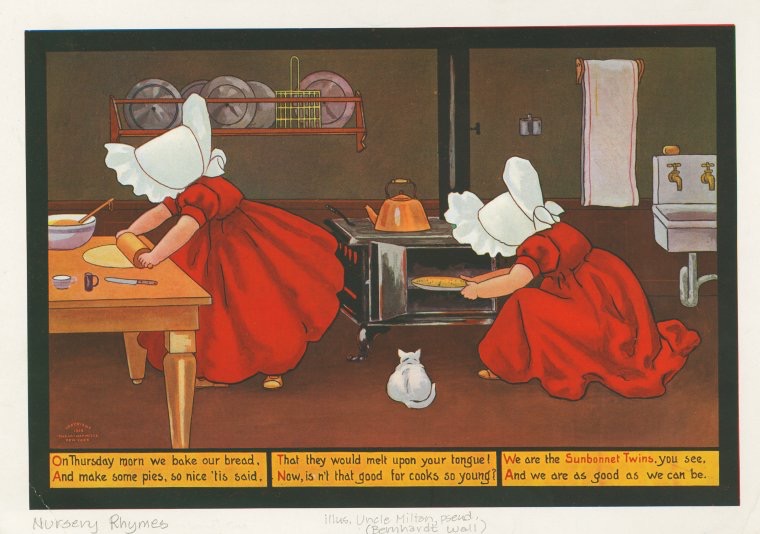
Bernhardt Wall: Sunbonnet twins baking. (1906)
" … just like every other Pairing of The Muse and her surroundings …"
The Muse continues to hone her political presence. Two months into her campaign, she's repeated her elevator speech dozens of times and has yet to completely memorize it. She is not practicing as an actor might with the idea of replicating each performance but with the notion that each iteration might prove authentic. Authenticity changes from performance to performance as each occurs within a unique context. There's never any telling which part of any context might prove defining. Sometimes it's the people, and other times, the hall; consistency couldn't possibly be the purpose of her practicing.
Here in this wine country, there's a lot of talk of Pairing, for each wine best combines with some sample of each menu.
WorstKept
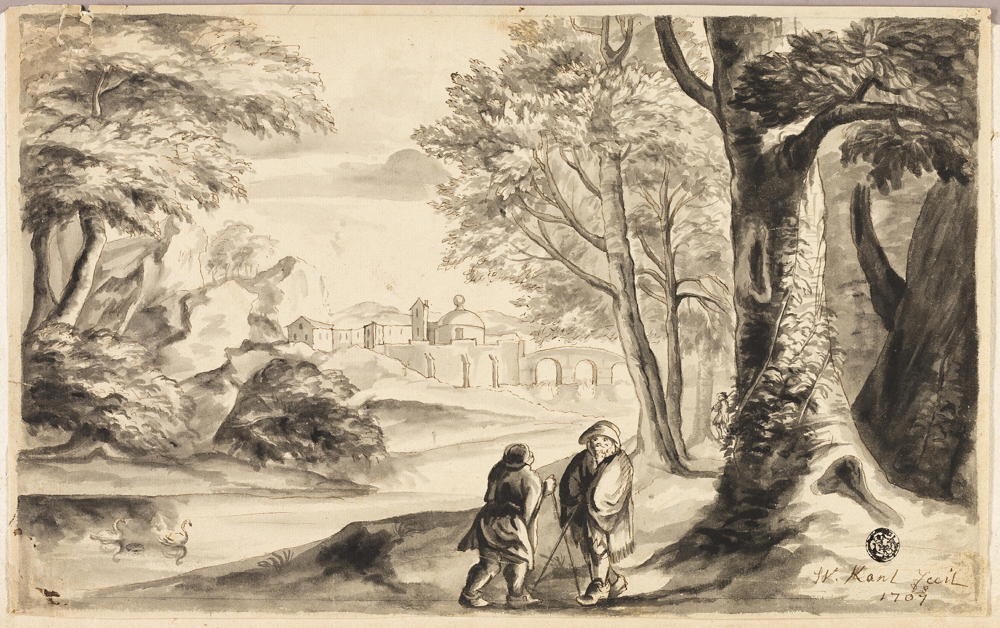
Unknown artist (German) or William Kent
Two Travelers under Tree
with Village and Bridge in Distance (1707)
"Thanks ever so much for finally …"
With the possible exception of confidential and top-secret government material, the best-kept secrets tend to be the WorstKept ones. This conclusion partly stems from the inescapable fact that anyone holding a secret might as well carry a neon sign across their chest declaring that they're holding a secret. With the possible exception of deep cover spies, almost everyone can tell when someone's withholding the whole truth and nothing but. That private business almost always turns out to be a whole lot more public than its holder ever suspects. If the lips don't loosen, some other body part will. As humans, we seem to ache to disclose, and this innate need renders our secrets into an abstruse form of public knowledge. They might not know the details yet, but they know for sure you're withholding and that the underlying story's eventually coming.
It's usually just a matter of waiting or asking.
CuttingCords
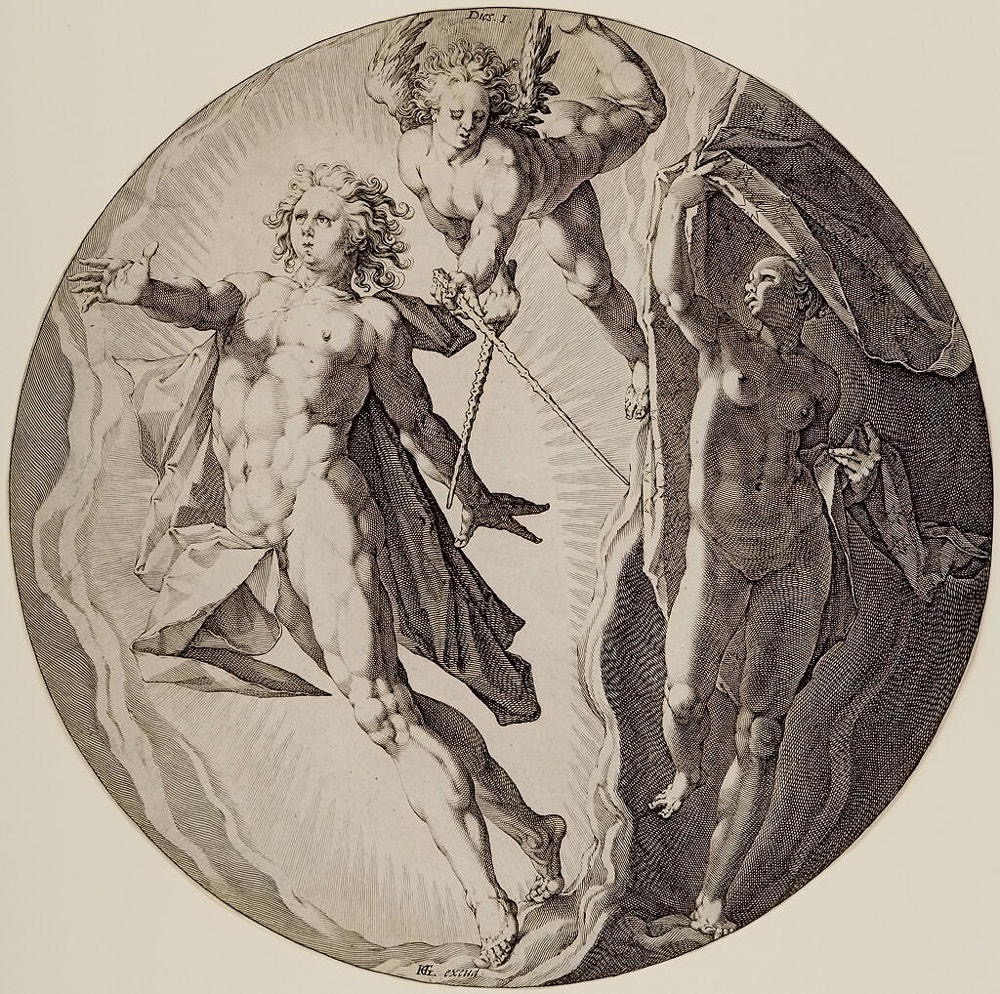
Jan Harmensz. Muller:
Creation of the World: Day One,
separation of light from dark (1589)
"I might regret the radical act, but later."
I'd decided when I first reviewed the standard contract they'd sent in response to my query. I'd been dreaming of working with this publisher for over a year, yet when confronted with the details of what that might entail, I knew in that instant we'd never consummate a deal. I'm no lawyer, a declaration my Business Law professor insisted I memorize, but I didn't need to be an expert in contract law to recognize an embarrassingly amateurish piece of ‘work.’ I felt embarrassed and angry. Embarrassed for the representative offering this P.O.S. and angry that anyone would have ever thought it might pass muster under any condition. I thought it must show the state of desperation and innocence combined in aspiring authors that anyone would ever sign such a thing, and then I felt embarrassed all over again for my compatriots.
A part of me thought I might have been too picky.
Wronging
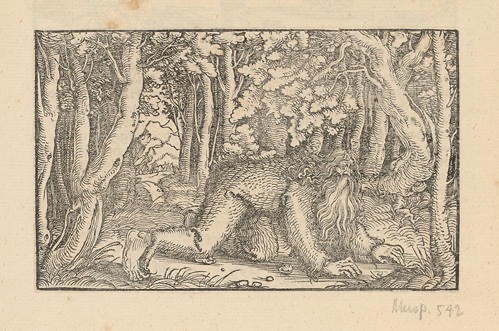
Hans Weiditz (II):
Behaarde man kruipt door een bos
[Hairy man crawls through a forest] (1514 - 1531)
" … without expecting to eventually avoid making more."
The Honing life involves more than and seems different from positive feedback loops. It primarily entails catching myself doing something wrong and nudging myself closer toward some path of righteousness, correcting my error if possible. My legacy might end up being a long series of close misses with a few more spectacular further misses sprinkled in for variety. Few hits and many, many misses. In the end, I will contend that I was in the game without often experiencing a winning season because my standards were never quite satisfied. My successes were failures, too, not usually on the scale of my catastrophes but of similar quality.
This lifestyle's no tragedy, far from it.
RealPain
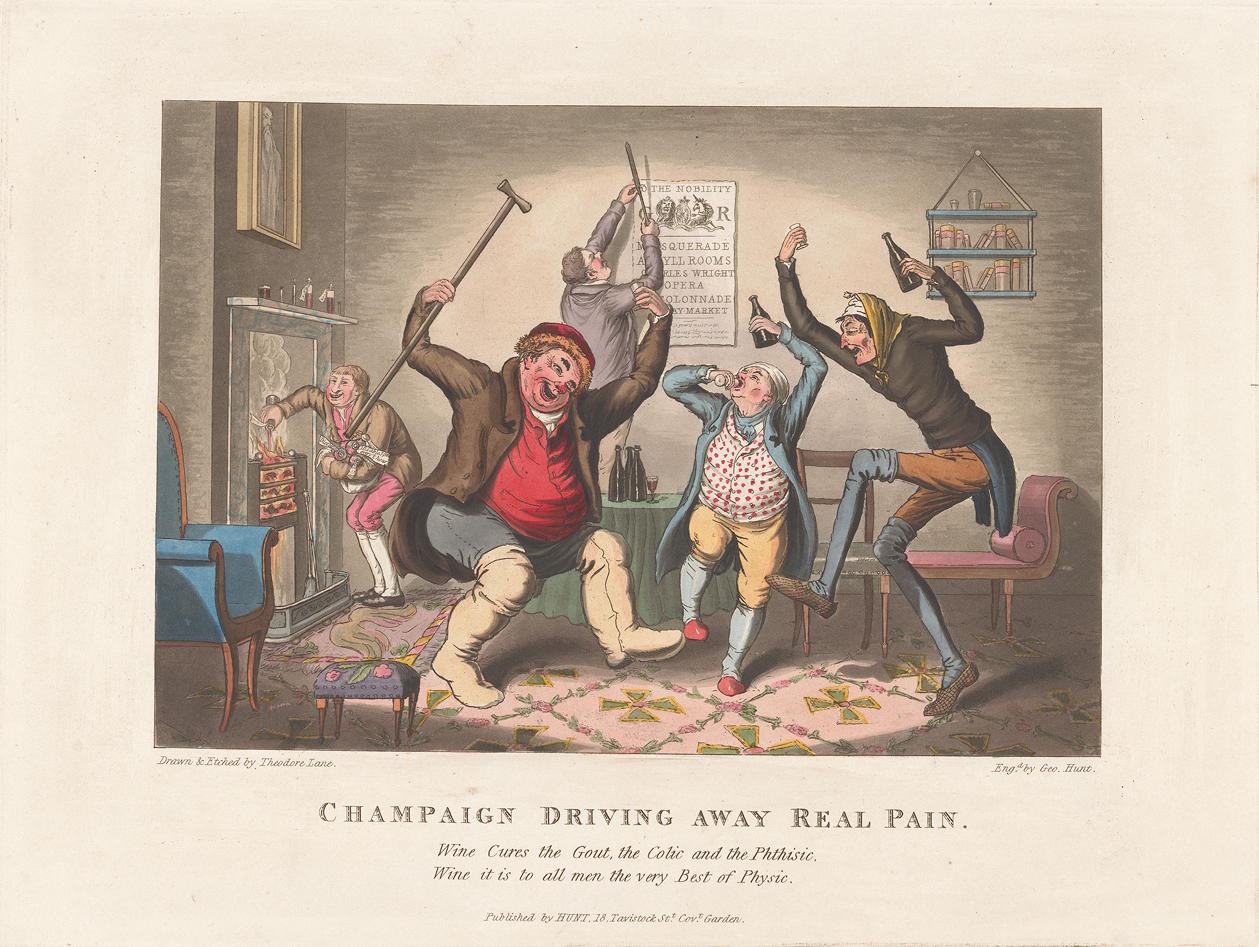
Theodore Lane: Champagne verdrijft de pijn
[Champagne driving away real pain] (1825 - 1826)
"Waiting seems the worse sort of RealPain."
I, probably like you, have sometimes been called a real pain in the ass. I confess to the charges even though I struggle to accept the concept of RealPain, for pain seems almost entirely illusory. That's not to say that pain can't make a reasonably convincing case that it sometimes has substance; it's just that whatever that substance might be, it seems extraordinarily elusive. Even medical doctors rely upon a silly cartoon chart to asses pain levels, and their test requires patients to assess and report their own levels when most patients lack adequate experience to pass such judgments. My little sister, who would cry at the drop of a hankie, might declare a pain level of eleven for something I'd most likely label a twinge.
I've lived with chronic pain but learned not to take it very seriously.
ZombieLand
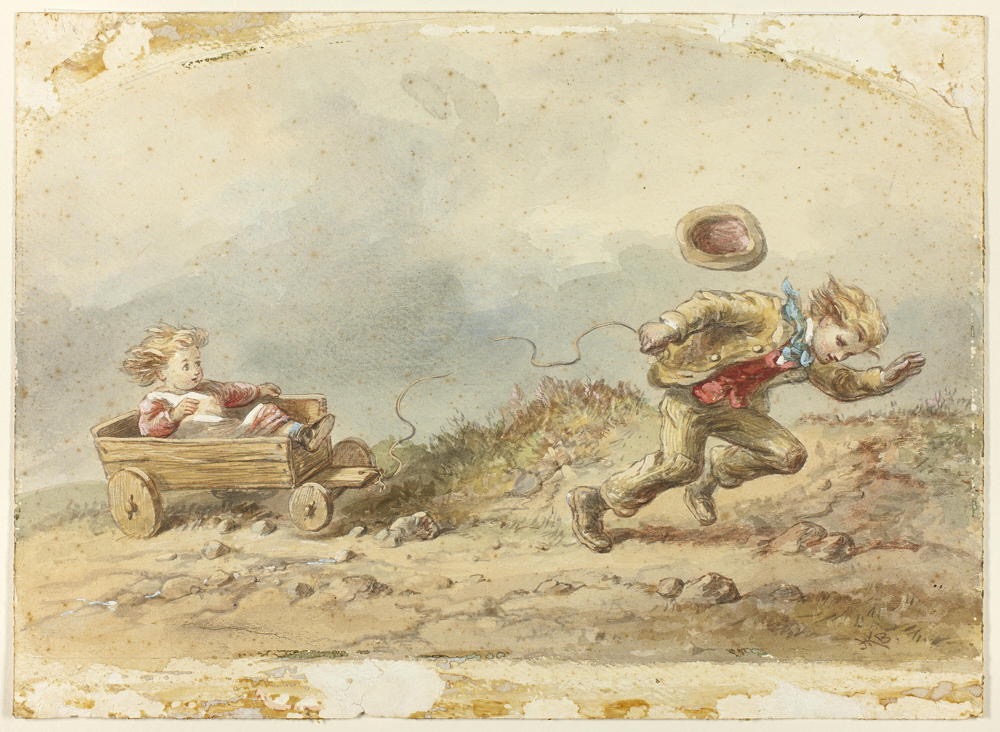
Hablot Knight Browne:
The Broken Cart-Rope
(n.d.-mid-nineteenth century)
Just before the 1929 market crash, economist John Maynard Keynes predicted that his grandchildren would, a hundred years hence, inhabit a world requiring them to work no more than fifteen hours per week. Even then, he insisted that fifteen hours would provide more labor than the economy would strictly need to effectively operate. We easily notice today that this prediction has yet to come to fruition, though we might notice too easily and miss seeing what's happening around us. Yes, most report ever-growing pressure to work ever more hours. Yes, overwork has developed somewhat of a cachet, a status symbol such that those who work the most believe themselves to be the most essential. Yes, everyone complains about their lack of leisure time, but I'm curious if leisure means what it meant back in 1929 when Keynes published his prediction.
Leisure time then didn't include a minute of cell phone time.
TottingUp
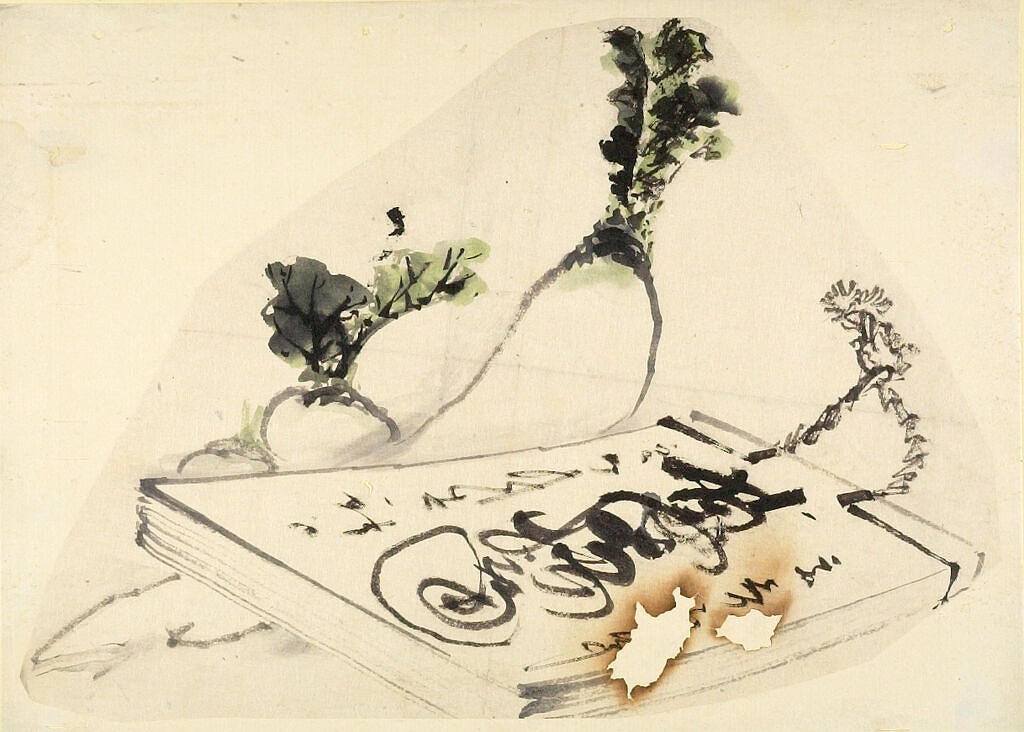
Unknown Artist:
Daikon Radish and Accounting Book (19th century)
“Data-Driven crazy …”
Come Friday morning, I'm TottingUp the week's receipts, just as if I ran a small business. I count the customers and imagine significances like bean counters have always done. I avoid the formal metrics, Google Analytics® and the like, because something about how I initially organized my web presence rendered it impossible to formally evaluate. I count contacts instead: likes, comments, and views assigning a nominal value of one (1) to each. For instance, a post like this week's Discernment attracted forty-nine views, no comments, and a single like on Facebook. It also showed twelve accesses via a LinkedIn link and twenty-one via my newer Substack path, for a total of eighty-four somethings. I have no idea what that number means other than it represents something equally indeterminant and rewarding. It's my payoff!
Since each of my stories seems separate and unique, they aren't comparable.
WritingSummary 07/06/2023

Lucian and Mary Brown:
Untitled [baby reaching for typewriter] (1950)
We Almost Exclusively Worship Mammon
General Electric, the once proud exemplar of mid-century industrial America, spouted its motto: "Progress is our most important product" in grandiose television advertisements. Productizing progress seems a fair portrait of our post-war arrogance, one still firmly held by our more conservative neighbors. GE's pride prefaced their fall at the hands of another CEO who firmly believed himself brighter than everyone before him. The ones since he retired have found ample reasons to wax their vitaes, too, since history seems to see old Jack Welch as short-sighted now. Such is vision when it confronts experience. It becomes so much schmutz on the old eyeglasses, eventually in the way of seeing what's right before one and whatever's behind. I exclusively wend my way. I take my time. I'm in no hurry to arrive; Lord knows where. I'm more of a journey-focused person. I feel fortunate to have stumbled into my present and even to be dragging my considerable past behind me. I gratefully do not have to drag all that much progress behind me. It might be that the Chamber of Commerce's mid-century characterizations of the future coming, featuring flying cars driven by Spandex® citizens, helped me better appreciate how it was rather than worship progress. I'm down on my knees most mornings whispering prayers of thanksgiving that this nation was not founded Christian. We almost exclusively worship mammon here, if we can think of that as any kind of organized religion.
OutOfSight
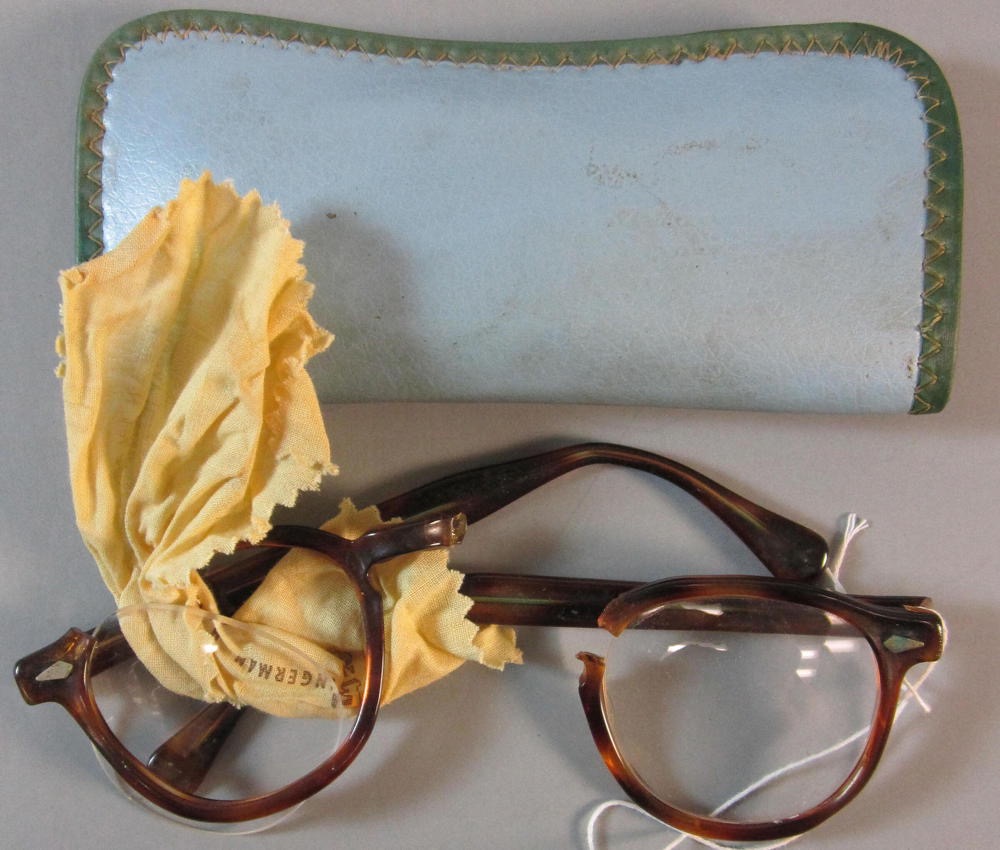
Collection of Barnett and Annalee Newman:
Eyeglasses, in case (20th century)
" … everything becomes clearer."
My eyeglasses collect schmutz better than any other substance known to man. I cannot keep up with them. Further, this schmutz seems invulnerable to any but a serious professional's hand. I, for instance, am powerless to clean my glasses. The Muse is forever noticing that I probably cannot see anything through the grimy layer accumulated on my lenses. She's apt to snatch them from my face, take them into the kitchen, and subject them to vigorous scrubbing before returning them, disgusted at my lack of hygiene and caring. I have grown indifferent and consider it my fate to move through the world half-blinded by schmutz. I occasionally visit a local optometrist to get that stuff professionally removed. My latest visit started a mystery that entertained me for two full weeks.
The person cleaning my glasses noted that the lenses had become seriously scratched in addition to the almost impenetrable layer of Schmutz.
RetailPolitics
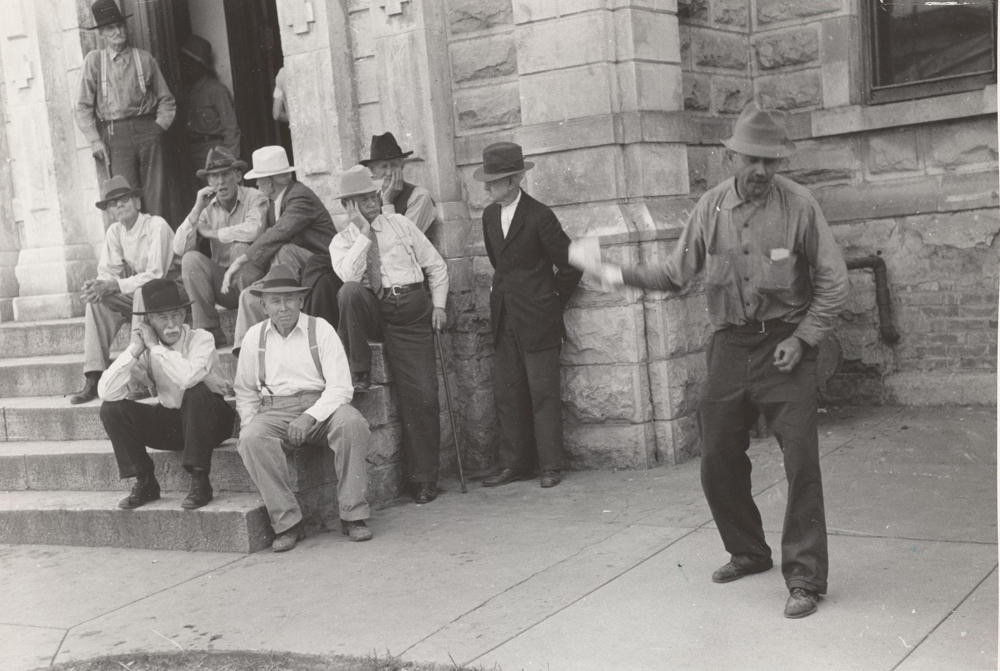
Russell Lee:
Group of residents of Weatherford, Texas,
listening to politician speak
(1939)
"This just seems a fait accomplis."
Politicians, like used-car salespersons, mostly deserve their terrible reputations. They seem to shave the truth more proficiently than a barber might shave a baby and just as unnecessarily. We approach them warily, if at all. We understand that they can put almost anybody under a thrall. We swear we will not fall again then we reliably do. We hold ourselves to blame but sense something profoundly unsound in our characterization. The politician can seem to be everybody's friend and also frame anybody as their enemy, seemingly the same person, sometimes simultaneously. We sense a dark art at work, another bait and switch, yet we still take sides. We justify the better of two obvious evils before voting the same straight ticket. Forced choice voting often leaves us sensing little choice at all.
The Muse is running for public office and so might well be fairly characterized as a politician, a politician being one who runs for public office.
Dandy
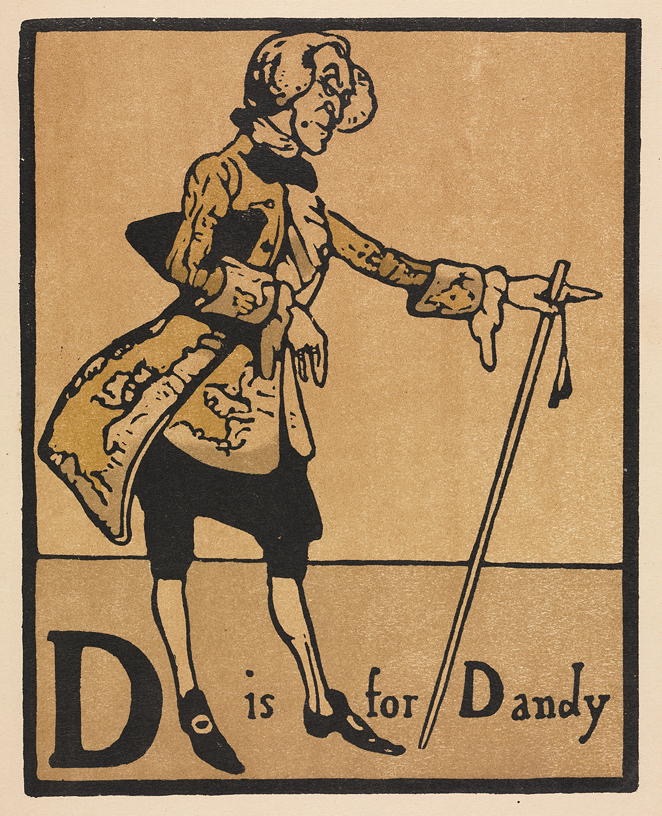
William Nicholson: An Alphabet: D is for Dandy (1897)
“ … not as anybody's Dandy, Yankee Doodle-Do, or died.”
I am not a Dandy, Doodle-Do, or otherwise. Come the Fourth of July, I do not rush out to buy my weight in fireworks. I'm more apt to hide behind the garage, praying with my eyes closed for an early cessation of whatever hostilities fueled the heavenly outrage. I do not consider the recreation of artillery barrages a fitting representation of our Democracy's intentions. We were never defined by our hostilities but by our peaceful nature. We were never the type to pick the fight, more the type to work hard to end it, though our record could be better on this one. We have been known as haughty but never in the way that monarchs can get. You know how they can get. Those dudes seem as Dandified as all get out. They look and act ridiculous. Not like Democrats or even Republicans, with exceptions notable because of their extreme departure from our usual No Dandies traditions.
We prefer the plain-spoken sort of politicians who can tell their story straight.
MakingDo

Lewis Wickes Hine: Making Pittsburg Stogies (1909)
"Envy us."
The Muse and I feel blessed to live very near the end of most commercial logistics networks. This Center of Our Universe isn't conveniently on the way to or from anywhere. Our founding fathers made deliberate decisions to isolate this valley. Rebuffing the railroads, they chose to forego what would have most certainly caused commercial development. At the time of the great silver rush into Northern Idaho, Spokane, today a city of over 200,000 souls, amounted to a sawmill and an isolated Indian Agency. Walla Walla reached its commercial peak then, about the same size as now, with both prospectors and their supplies routed North through what was then the commercial center of the whole Northwest. No longer.
Likely, a few things on our shopping lists will not be available here for any price.
Garge
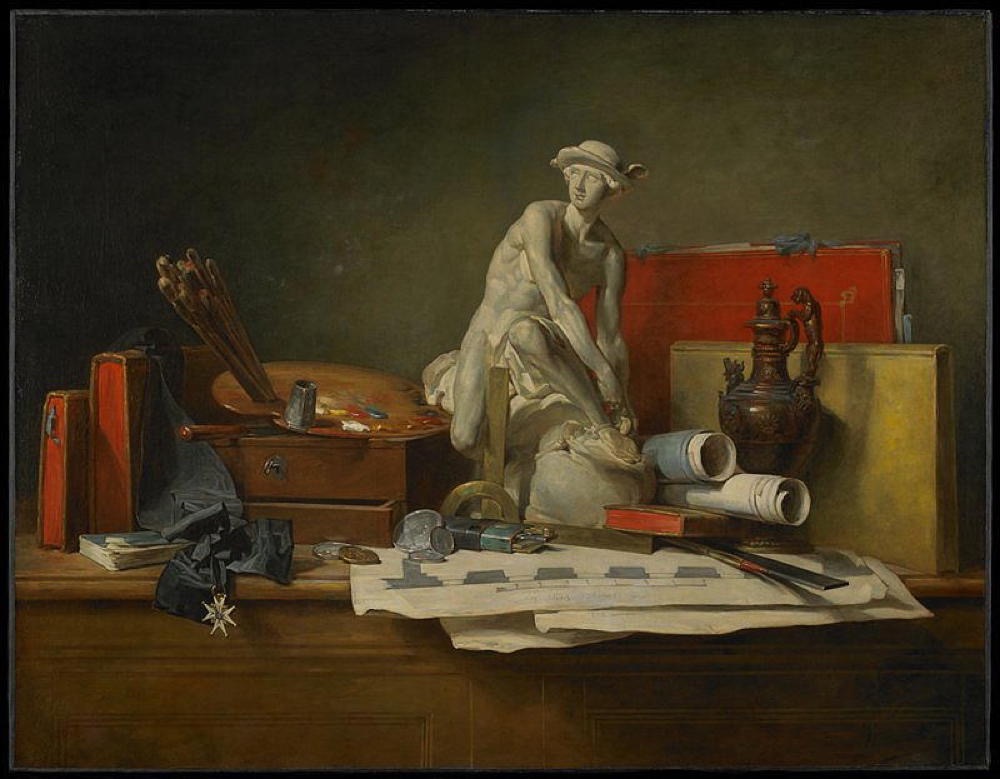
Jean-Baptiste-Siméon Chardin:
The Attributes of the Arts and the Rewards Which Are Accorded Them
(1766)
" … I tidy until my soul can breathe again."
I think of myself as reasonably fastidious but lapse a lot in practice. My garage serves as my center, the abiding indicator of my general well-being. For many, their desktop serves this purpose, the clutter or absence of it the reliable outward sign of an inward orderliness. My desktop has never not been an apparent disaster, yet I can place a finger on anything teetering there faster than I can recover anything anywhere. Obvious clutter does not necessarily speak to internal disorderliness except in the case of my garage or, as I refer to it, my Garge.
Being the absolute center of my universe, my Garge says most about my mental health.
Arcing
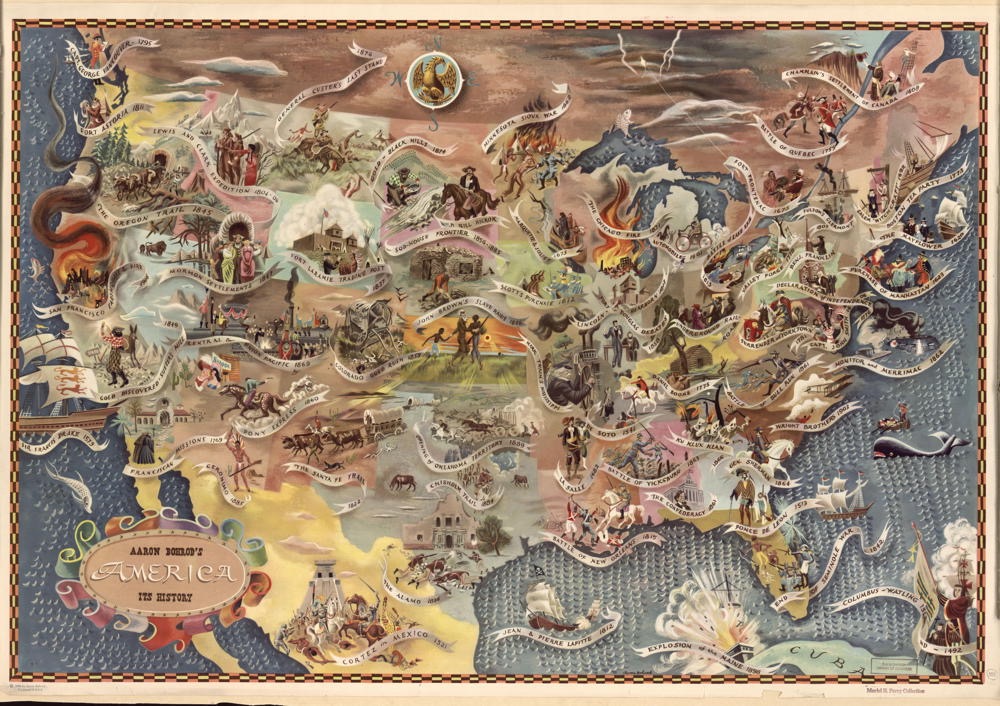
Aaron Bohrod's America, its history (1946)
"We shall overcome because the arc of the moral universe is long but it bends toward justice. "
–Dr. Martin Luther King Jr.,
“Remaining Awake Through a Great Revolution.”
Speech given at the National Cathedral,
March 31, 1968
" … thinking ourselves especially blessed."
The history of these United States records a definite Arcing trajectory. We do not do straight lines. Neither did our forebears. We sidle up to our futures and tend to wend away from our results. We move like drunken sailors inexorably toward our salvation, and we, probably above everything, firmly believe in our eventual salvation. Any half-baked efficiency expert could demonstrate the obvious errors in our ways, in our methods, but we seem unteachable, uninterested in straightforward pathways. We're so damned busy meandering that we can only ever see trees, rarely forest. We disagree about almost everything yet insist that we're somehow united, one nation under our multitudinous God, with aspiration enough for all. Liberty and justice might seem to be trailing ever further behind, but that's just an illusion, the result of our Arcing course, making it damnably difficult to precisely pinpoint our position on our path toward our sure salvation.
Democracy amounts to the ultimate faith-based initiative.


